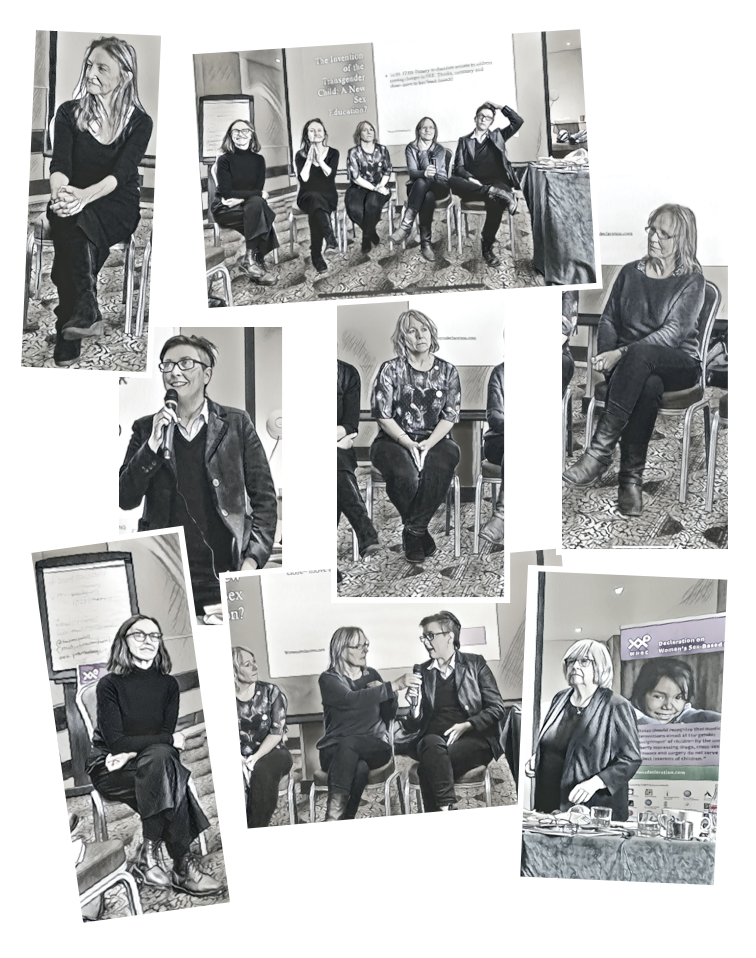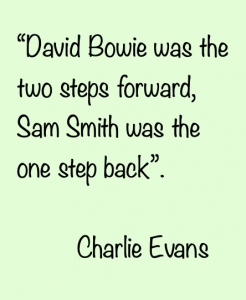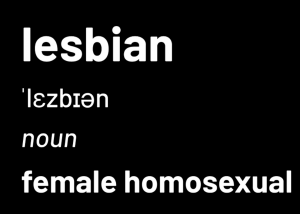
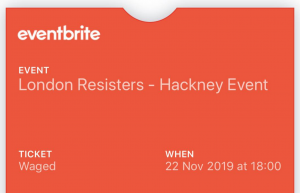
“Are you concerned about child safeguarding, safety in prisons, securing the future of women’s sport, single-sex NHS wards, sexism- pay equality?” demanded the leaflet.
Well, yes, I am indeed, two tickets please. I arranged to meet Lesley near the venue, dug out my ‘Adult Human Female’ notebook and pen and I was ready to go.
It’s getting colder in London, and darker earlier of course- sunset at 4pm FFS! By the time I headed out of the house, clad in a coat that wouldn’t have looked out of place in Antarctica, the sky was dark and the streets were illuminated with the premature glare of precocious Christmas lights.

the new venue
Happily munching on a Gregg’s vegan sausage roll and swigging from a flask of warm coffee, I arrived at the place where I thought the meeting was going to take place to find windows shuttered, doors locked and not a soul in sight.
Checked my messages- ah yes, two texts and an email telling me the venue had been changed at the last minute. I texted Lesley (who was stuck in traffic somewhere halfway round the M25) the new postcode, and turned around.
I had plenty of time to retrace my steps to the new venue, where organisers were already busy setting up chairs and recording equipment and covering the windows with newspaper in case any troublemakers turned up (they didn’t).

covering the windows
There was a small cafe at the back of the hall, so I put my bag and coat on two seats in the front row while I grabbed another cup of coffee and a piece of cake.
Each chair sported two leaflets, one from OBJECT and one from Hackney Resisters, the organisers of the event. I admired the artwork on the front of the Resisters leaflet, then turned it over to read the back.

The leaflet laid out the aims of the Resisters and named the night’s speakers: Allison Bailey, barrister and co-founder of the LGB Alliance, and Stephanie Davies-Arai, founder of Transgender Trend and author of ‘Communicating with Kids‘.
By the time the meeting was ready to start there were close to a hundred people in the room, mostly women, and Jan had to call for quiet several times before we fell silent.
I checked my phone quickly. Lesley was still stuck on the motorway.
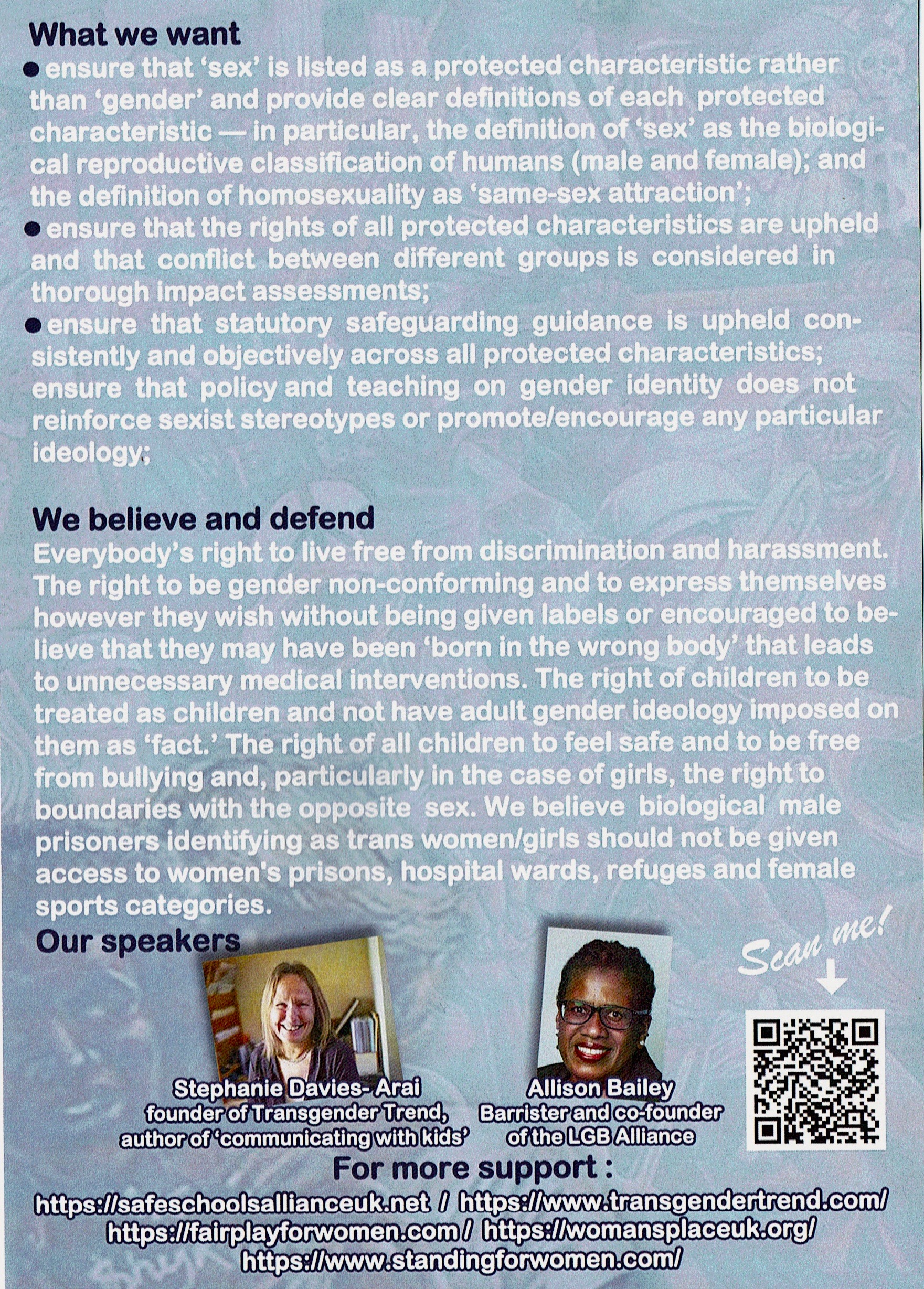
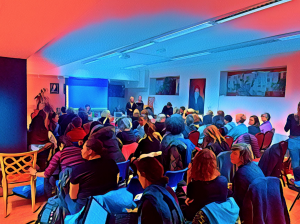
The venue fills up as we grab coffee and seats before the first speaker.
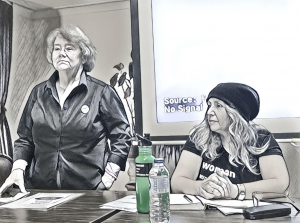
Jan Williams (left) and Heidi
Jan Williams praised the centre for allowing us to meet there and introduced herself as the Chair of OBJECT ‘the first mainstream feminist organisation to come out on the trans issue’.
After introducing the ‘three wonderful speakers‘ Jan reminded us that question time was for actual questions, adding that she hoped there would be extra time at the end for discussing what sort of action we could be involved in.
“I’m sure there will be loads of questions and comments: please be brief.” She emphasised the importance of action as well as talk. “It’s very easy to sit here and say ‘this is awful’ but will be much more effective if we co-ordinate and act together for change.”
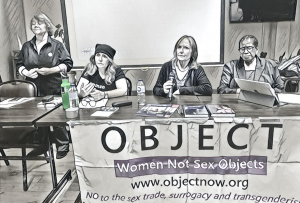
To much whooping and applause she handed the microphone to Allison Bailey.
Allison Bailey
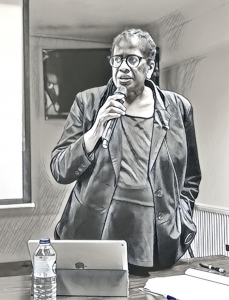
Allison Bailey, barrister
Bailey is a barrister with almost twenty years experience. She came out as a lesbian at the age of 17 and ‘never imagined I would have to defend the right of women to speak about our rights‘.
The idea that a man should be able to self-identify as a woman is ‘absolute madness‘ and Bailey described Stonewall’s ‘acceptance without exception’ policy as ‘a big sign welcoming every predatory, unhinged man who hates women to come forward with impunity… an obscene violation of our hard-won rights’.
Women & girls need single sex spaces because of the danger that men present to them. De facto self ID is not just happening in prisons and hospitals: Allison also referred to the Canadian Rape Crisis Centre that lost its funding because it refused to accept ‘male-bodied people’.
The current state of the law in this country is being completely ignored and Bailey has lost count of the times she has seen organisations claiming gender identity is a protected characteristic under current legislation. The result of this is that not just these organisations, but now government departments, are acting as if self-ID is the law. It is not.
“None of our politicians seem to have the courage to speak up and say this is unacceptable.“
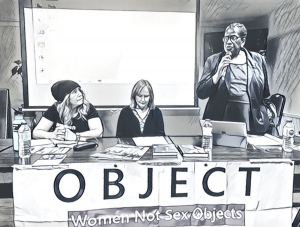
The current Labour manifesto has committed to two wholly incompatible aims. To keep single-sex provision but also support the self-declaration of sex. Bailey says she is left with no idea who to vote for: ‘this feels like a complete stitch up between the parties… there is no real choice being offered’.
Bailey asserts that the many ambitious barristers who made their names on human rights issues, yet have been silent on this issue, will eventually be called to task for their cowardice.
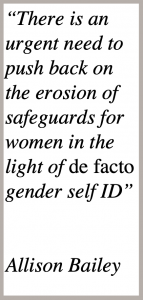 Male-bodied rapists are not receiving the ‘on your bike’ response one would expect when requesting to be placed in women’s prisons. Allison pointed out that a judge does not blindly accept the word of a violent man protesting his innocence, yet men in prison are demanding to be referred to as women- even placed in women’s prisons- on the basic of nothing more than their own say so. There are no provisions to ensure that sex offenders cannot identify as women and anyone pointing out the danger of this is called transphobic.
Male-bodied rapists are not receiving the ‘on your bike’ response one would expect when requesting to be placed in women’s prisons. Allison pointed out that a judge does not blindly accept the word of a violent man protesting his innocence, yet men in prison are demanding to be referred to as women- even placed in women’s prisons- on the basic of nothing more than their own say so. There are no provisions to ensure that sex offenders cannot identify as women and anyone pointing out the danger of this is called transphobic.
Bailey said that her concern was not around transwomen, stating firmly, “I absolutely support the fact that they must live free from discrimination with protection under the law. That isn’t the issue”.
Her concern is about the ‘wickedly devious’ predatory men who would abuse the system.
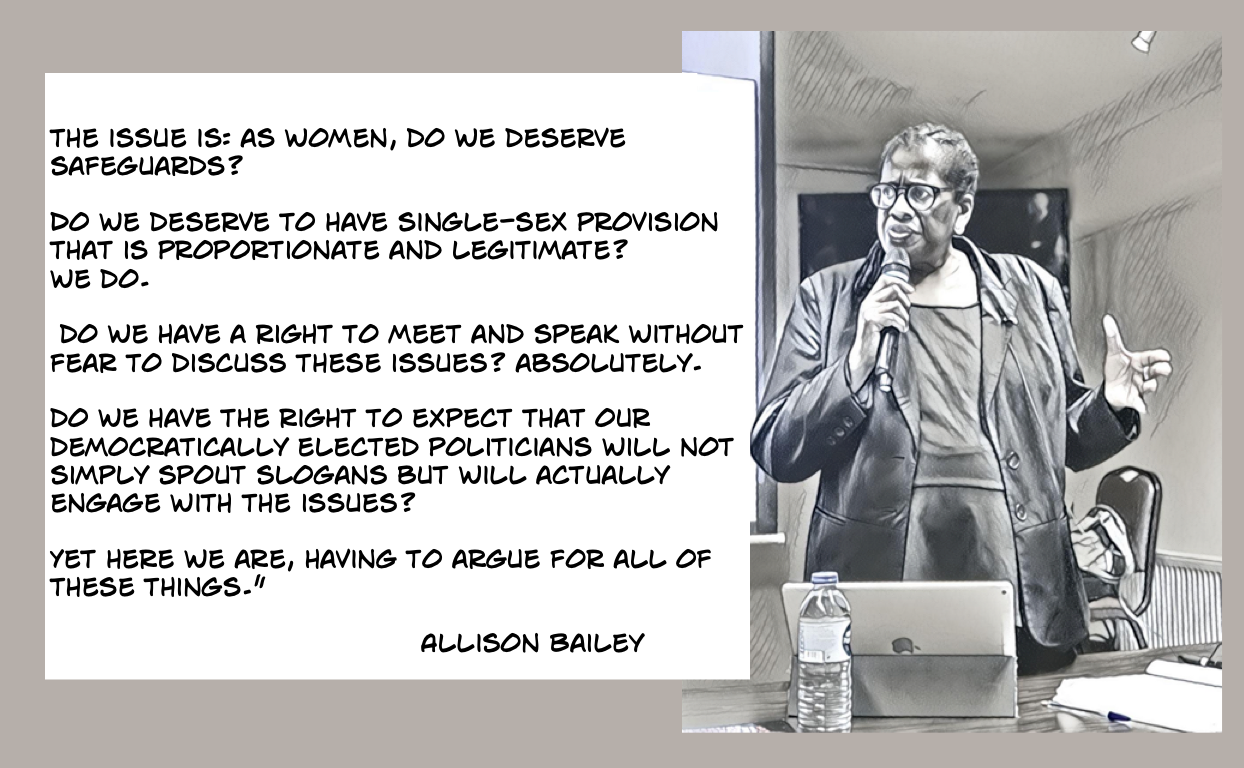
Crime statistics
Allison emphasised the importance of how we are recording crime. A murmur of agreement ran round the room when she noted that if the recording of male crimes as female carries on, if the police allow self-ID at the point of arrest, we will lose the ability to measure the crime profile of men who transitioned.
“”We’ve now got a massive increase in women committing rape… In England and Wales, rape can only be committed by a penis-haver, yet here we have, reported in the press; reported by police forces in court; female rapists. It is the height of offence. We have the Crown Prosecution Service putting out guidance to say – this is the stuff of nightmares quite frankly – that a male rapist can rape on Monday and by Wednesday when he’s in the Crown Court identify as a woman and the guidance is that everyone must now refer to this person with feminine pronouns.”
Here she asserted that this is currently only guidance, and there can be no compelled speech of that kind at present, quoting Selina Todd: “politics driven by fear are completely at odds with democracy”.
In the course of setting up the LGB Alliance, Allison and others received abuse from some: “the usual stuff that comes along after they say TERF”. She noted that many of those who had seen this happen still insisted that she must ‘keep in a political alliance’ with those who give out that abuse – and that to try to break free from it is to risk losing her job.
She said she received support from people all over the world and that she felt the tide was turning, citing the current cases of Maya Forstater and Harry Miller.
She concluded that movements can enact change very quickly, citing the importance of putting pressure on our MPs and politicians, and urged those present at the meeting to come out as gender critical.
“You’re going to have to take a licking, but you know what? There’s an army of women that have your back.”

Questions
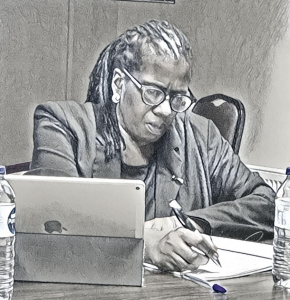 A woman from Haringey Resisters and the Labour Party asked how we can challenge self-identification generally, that people are self-identifying their race, if they’re disabled or autistic, and asked how this could be challenged.
A woman from Haringey Resisters and the Labour Party asked how we can challenge self-identification generally, that people are self-identifying their race, if they’re disabled or autistic, and asked how this could be challenged.
Bailey responded that while her current focus was concerning self-identification of sex, “we have to have laws based on some sort of verifiable reality, otherwise we are lost,” adding, “if anything the GRA needs to be strengthened and not relaxed… because of the cantankerous and mischievous individuals who will abuse it.”
A woman with a legal background asked what steps could be overcome concerning mixed sex toilets in private institutions such as the workplace and Bailey responded that ‘we need to keep going to law’ and challenging policies, suggesting that one ‘well crafted letter’ can often cause an HR department to back down.
A woman expressed her concern that teachers were being encouraged to ‘look out for’ transgender children rather than dealing with the bullying that gender non-conforming children can face. There was speculation as to how the legal position concerning women’s rights, free speech and protected beliefs might move forwards.
I looked round the room and noticed that Lesley had arrived and slipped in at the back. Question time finished, to much applause, and Williams announced the next speaker.
Stephanie Davies-Arai

Stephanie Davies-Arai, author
“Most of you obviously know her already,” Jan responded to the applause, “but for those that don’t, Stephanie is the founder of Transgender Trend.”
Walker told us the exciting news that Transgender Trend is about to publish its first book for early years children, called ‘My Body is Me’.
Stephanie was going to talk about the particular harms to girls caused by self-ID, and her talk would be accompanied by slides.

The Transgender Trend schools packs and three books to which Davies-Arai has contributed chapters.
 Stephanie began by moving to the front of the speakers’ table so that she could use her slides, telling us that she was going to talk about gender identity teaching in schools, and how self-ID is being imposed on children with no question. Children, she said, are not developmentally capable of questioning an ideology that is being taught to them as fact. The graphs and graphics used in this report are taken from Davies-Arai’s slideshow.
Stephanie began by moving to the front of the speakers’ table so that she could use her slides, telling us that she was going to talk about gender identity teaching in schools, and how self-ID is being imposed on children with no question. Children, she said, are not developmentally capable of questioning an ideology that is being taught to them as fact. The graphs and graphics used in this report are taken from Davies-Arai’s slideshow.
Gender identity teaching harms girls in particular. Girls who are gender dysphoric and identify as boys comprise 75% of Tavistock referrals, showing that girls are more affected than boys. The erosion of single sex spaces, such as toilets, in schools also harms girls more than boys.
In 1966, 90% of adult transsexuals were male. Now in 2019 – 75% of referrals to the Tavistock GIDS are female , and we have no explanation for that.
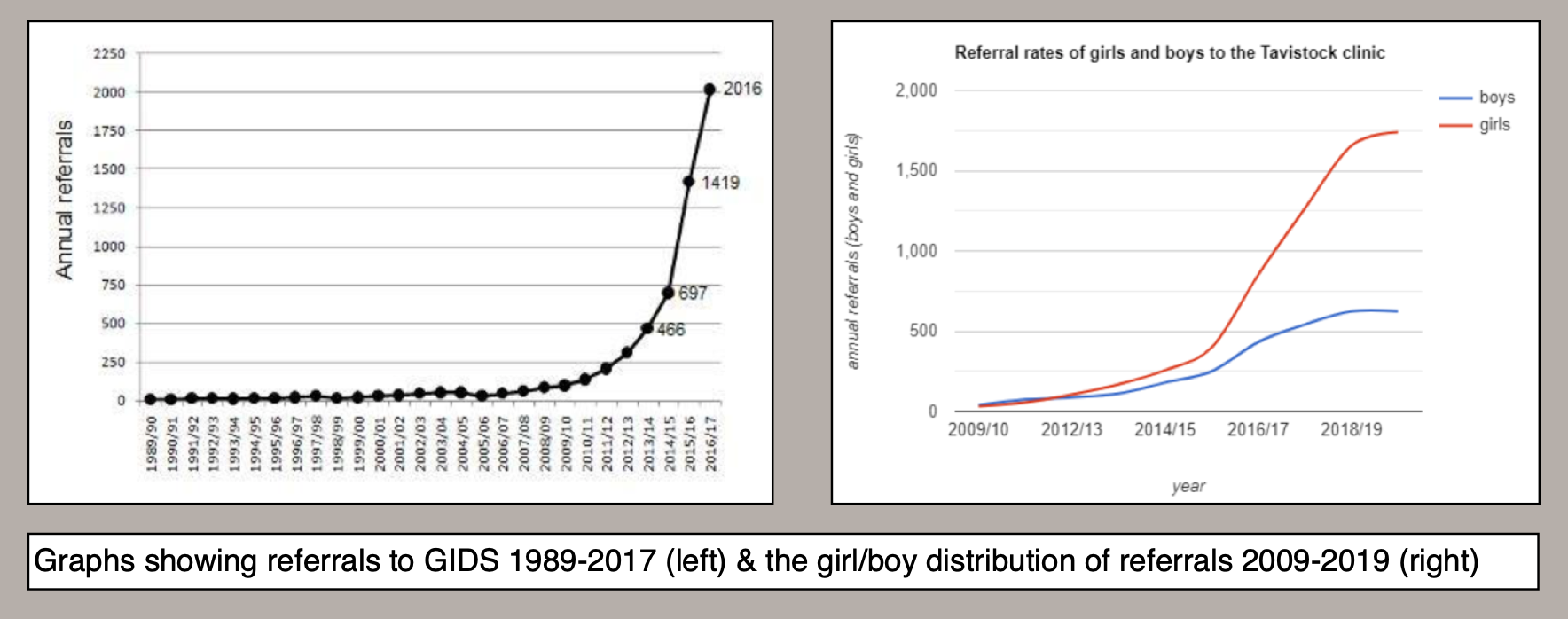
childhood onset gender dysphoria
Traditionally childhood onset gender dysphoria is a very rare condition that only affects boys. Around 2009 the figure began to rise and a few years later girls overtook boys. This is not the pattern of gender dysphoria we know because it is starting in early adolescence.
In girls it was completely unheard of, and Davies-Arai is unimpressed by the explanation that ‘trans people are more visible’ and ‘now children know where to go’ which explains neither the increase in numbers nor the disparity in the sex ratio. The increase in figures for boys need investigation but are ‘completely overshadowed‘ by the increase in girls.
Looking at this pie chart we can see that children aged 13-16 comprise the biggest increase, and the thin, pale blue slice that is 17 year olds is so small because most 17 year olds are being seen by adult services.
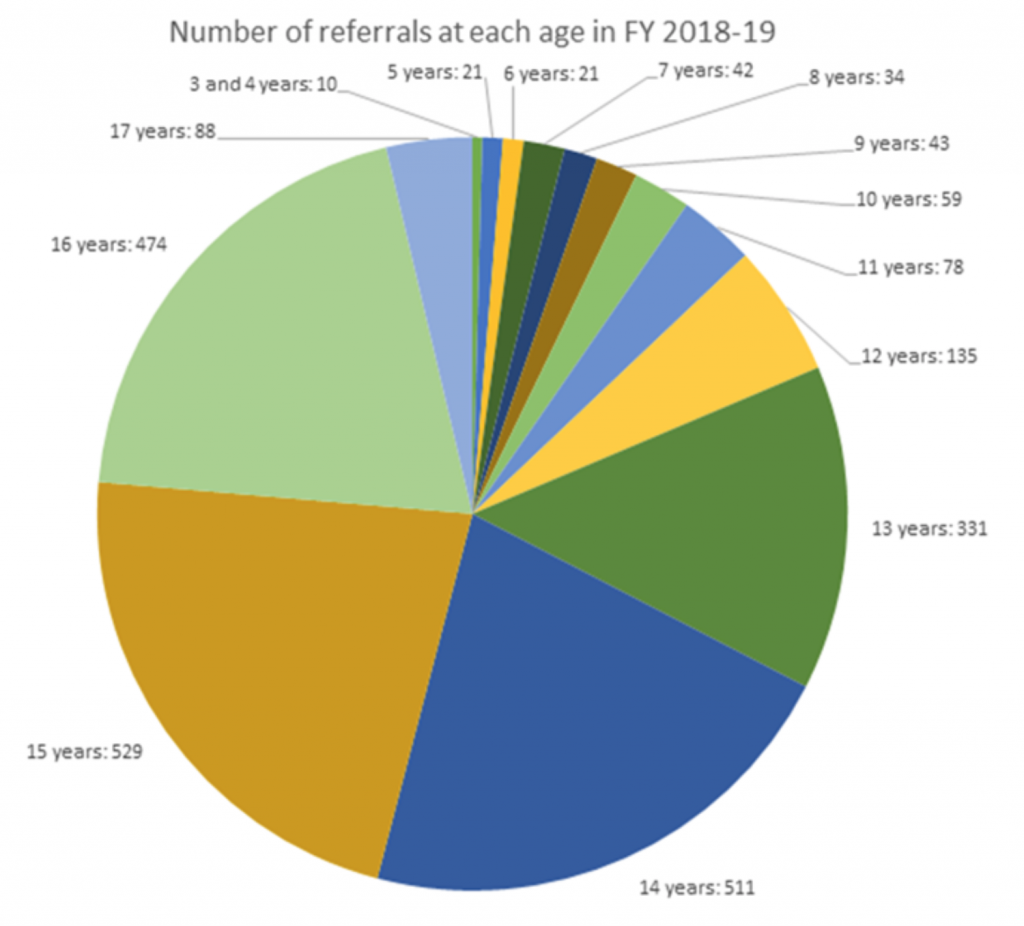
“For me, one of the biggest issues is that the age group 17-25, which is when the brain finishes its development, is an age group that completely falls through the cracks because 17 year olds know they can go to an adult clinic and the clinic will do afirmation and informed consent.”
This self-diagnosis is unknown elsewhere within the NHS, Arai-Davies says.
Davies-Arai referred us to Lisa Littman’s study on parental reports of adolescent children coming out with ROGD and the startling statistics surrounding them. 82.8% children were female, with a mean age of 16.4 years. A huge 41% had expressed a non-heterosexual orientation before identifying as transgender and 62.5% were diagnosed with at least one mental health disorder or neurodevelopmental disability before experiencing ROGD.
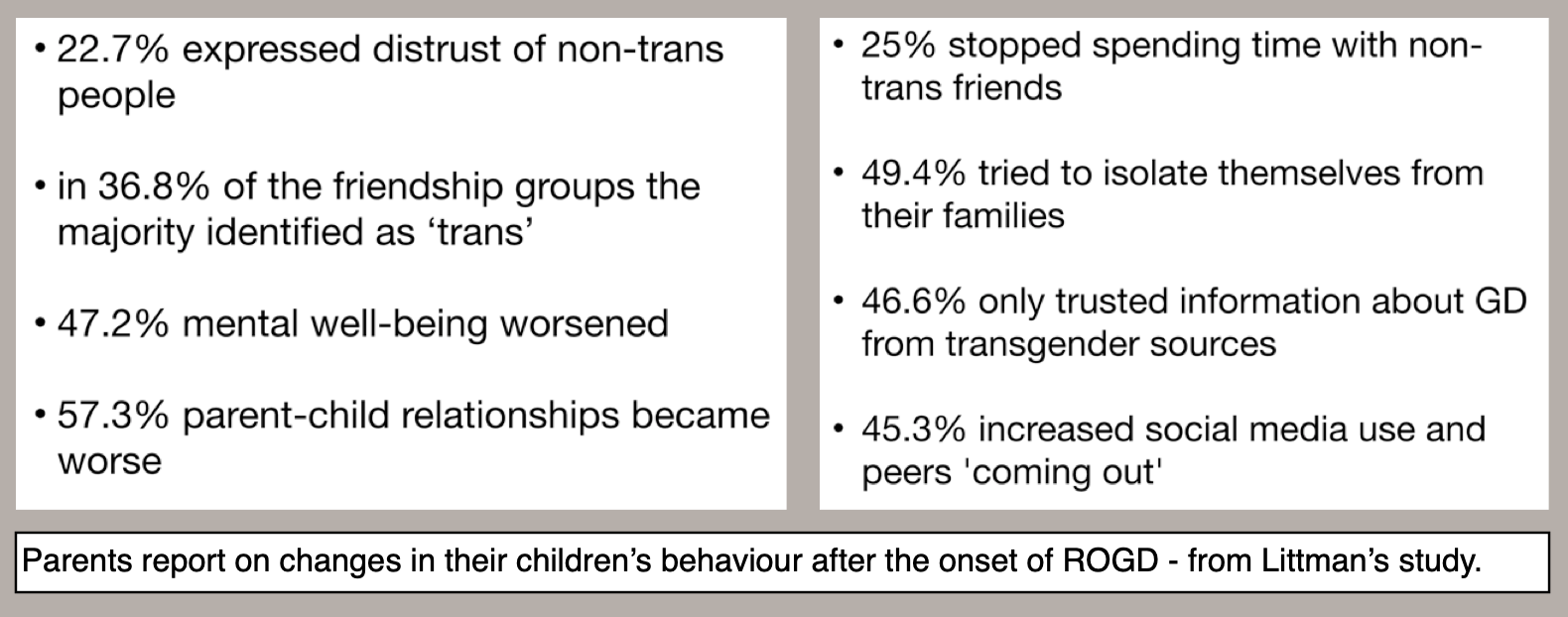
Stephanie added that Tavistock figures show ROGD children are more likely to have significant psychopathology and broader identity confusion than identity issues alone.
A study in Finland suggests autism spectrum problems are common. Another study showed 10% had experienced sexual abuse. These are ‘our most vulnerable cohort of children’.
In schools, it is now much cooler to be trans than to be a ‘boring old lesbian’ and trans-identified girls have often been previously bullied for being lesbian.
She paused for a moment and sighed. “This is really distressing, I know that.”
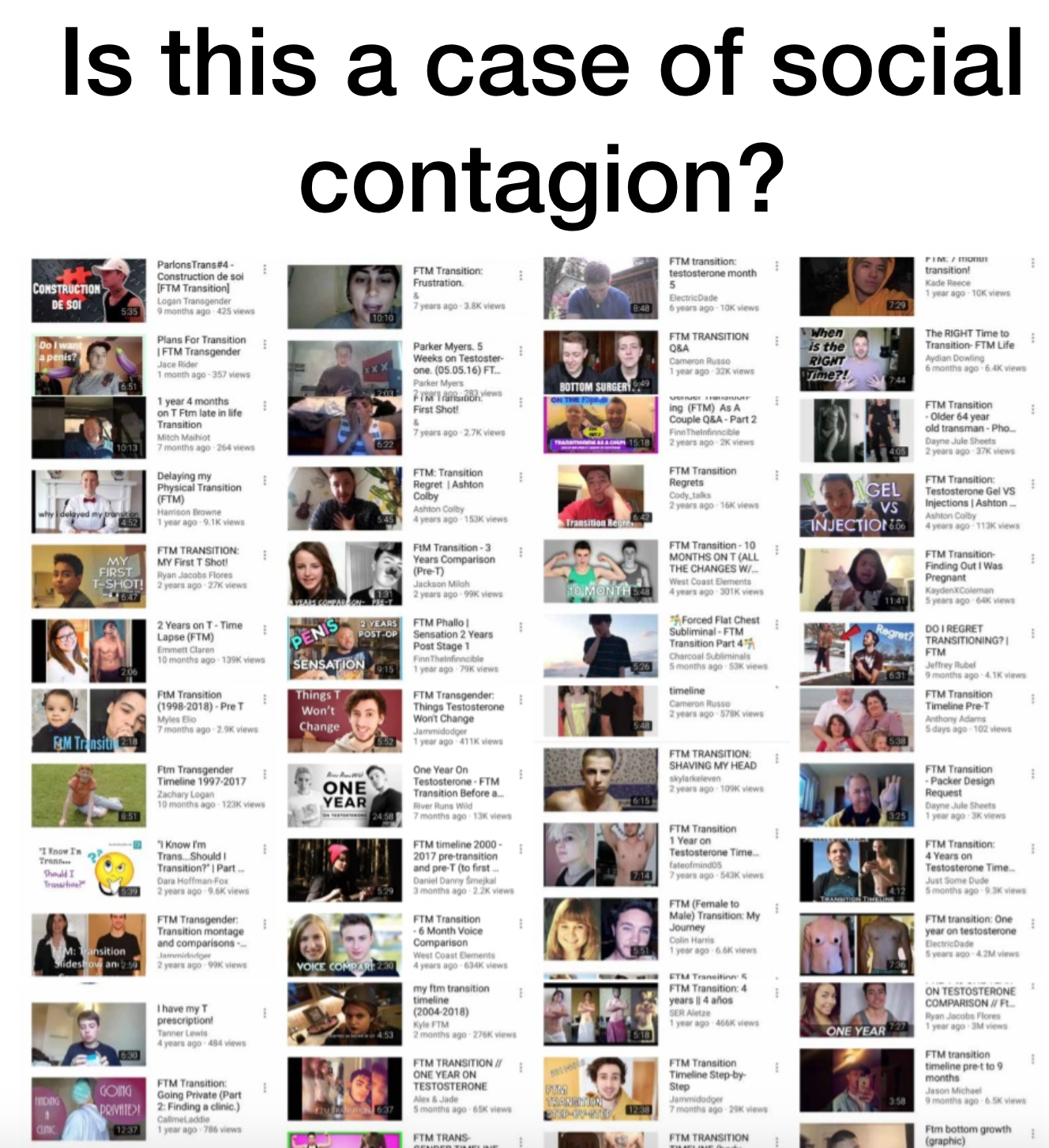
The spread of social media is a huge contributing factor and there are hundreds of videos on YouTube documenting the transition, testosterone and ‘top surgery’. Adults, she added, can underestimate the extent to which young people live in a virtual world and the boundaries between the ‘real’ world and the online world can become blurred.
“It has become a glamourised pathway and the myth is sold that it is transforming- you can become a different person.’
While traditionally around 80% of trans-identified children desist with ‘watchful waiting’, under the new pathway of ‘affirmation’ and social transition, 45% progress to medical transition.
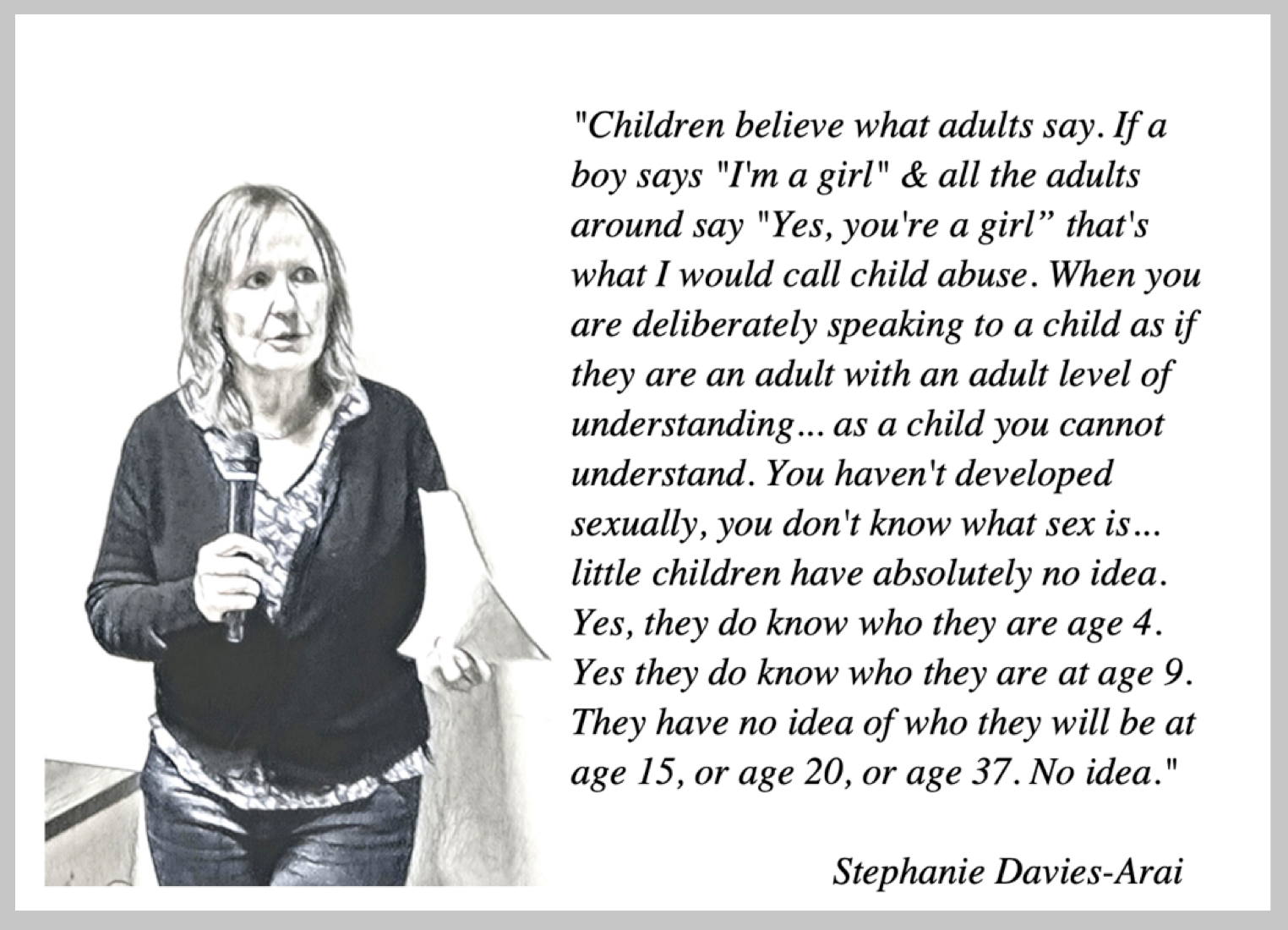
It makes sense that if a child is affirmed, they will persist, and persistence leads to a medical pathway. It is claimed by some that social transition and affirmation are benign and not a medical treatment.

Some of the potential side effects of breast binding.
Davies-Arai asserts that far from being a benign approach, these are actually extreme psychological treatments which frequently lead to future medical treatment. Even girls who do not go on to have an elective double mastectomy will be binding their breasts, and she asserts that the phrase ‘chest binding’ avoids the reality of what is happening.
Puberty Blockers
The 2010-11 experiment at the Tavistock has raised many ethical concerns: blockers were intended for a very small cohort of children who had suffered extremely since early chidhood and persisted into adolescence. During the trial, the age of subjects was lowered, and before the trial was over it was declared a success.
Biggs study suggested that girls’ bone density did not increase on puberty blockers and that there was an increase in suicide ideation. Recent trials on sheep have suggested blockers can cause neurological effects, including affecting short term spatial memory.
“There is a window for neurological development and if it’s missed, you’ve missed it… we have tested puberty blockers at time of natural puberty on children before we have tested them on animals- that’s unprecedented.”
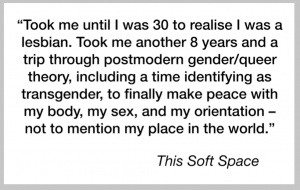
Detransitioners are beginning to speak out. Overwhelmingly young women, detransitioners’ bodies, voices and hair have often undergone irreversible changes.
The medical and teaching professions, and the government, are not asking enough questions about the results of the affirmation approach: on lesbians, on autistic children; on children who have been subject to sexual abuse, or present with previous and present mental health problems.
Stephanie referred to the extreme sex stereotypes in childhood marketing, porn culture, homophobia and misogyny and suggested that these things may make some lesbians feel it is safer to be read as men. Social media plays its part, and allows contagion to spread so much faster than it could historically.
“There has been a real targeting of children’s education… of children in schools, but also targeting of gender identity services… who have pressure put on them by groups like Mermaids and GIRES and Gendered Intelligence, for affirmation and for earlier and earlier medical transition. In adult society we are saying ‘yes you can identify as a woman, yes you’ve got a penis’, you don’t have to change your clothes even… yet the same activists are campaigning for earlier and earlier medicalisation of children. That’s a real anomaly to me.”
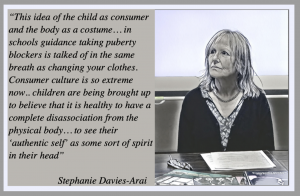
Stephanie urged parents, aunts, uncles, grandparents, to order a free schools pack for their child’s school from Transgender Trend.
Much schools guidance is based on biological sex and current statutory guidance reflects that. Where schools fail to comply with this, parents can object.
Replacing ‘sex’ with ‘gender identity’ in school policies “results in confidentiality/secrecy issues, parental alienation and erosion of sexual boundaries”. The idea that you cannot ‘out’ a trans child means children are being expected to keep that a secret, and “secrets about sex put children at risk”.
Davies-Arai said she often heard of children being transitioned behind their parents backs and then the parents finding out about it. While schools have their own safeguarding policies, promising confidentiality to a child breaks the first rule of safeguarding. She adds that implementation of policies that take away single sex spaces for girls are in violation of girls’ boundaries, and parents should make objections known to schools.
The law states, “separate toilet and washing facilities must be provided for boys and girls aged 8 years and over pursuant to Regulation 4 of the School Premises (England) Regulations 2012, which falls within the exemption provided for in Schedule 22 of the Equality Act 2010”.
A DOE publication from 2018 proclaims:
“Sexual violence and sexual harassment between children in schools and colleges: For the purpose of this advice, when referring to sexual harassment we mean ‘unwanted conduct of a sexual nature’ that can occur online and offline. When we reference sexual harassment, we do so in the context of child on child sexual harassment. Sexual harassment is likely to: violate a child’s dignity, and/or make them feel intimidated, degraded or humiliated and/or create a hostile, offensive or sexualised environment.”
Davies-Arai points out that by this definition a girl being forced to share intimate spaces with boys would constitute a form of sexual harassment. To object to sharing spaces with a boy who claims to be a girl sets a girl up as either a prude or a bigot at a time of life when peer approval is so very important, and to put a girl in that position “is emotional manipulation and coercive control.“
She recommended using existing statutory guidance to point out safeguarding issues to your child’s school, concluding, “This is safeguarding… and a school will fail OFSTED if it fails safeguarding. Parents, you have power.”

You can download or order a schools resource pack from Transgender Trend here.
The break

Stephanie stepped down to great applause; Williams announced that we now were halfway through the meeting and we were going to take a short break. I scooted across the room to meet Lesley.
The break wasn’t really long enough to do much: the more committed fag-smokers popped outside for a puff and Lesley and I had a quick catch up and greeted a few familiar faces.
“Have you started organising your event yet?” somebody asked me.
“Er, no.”
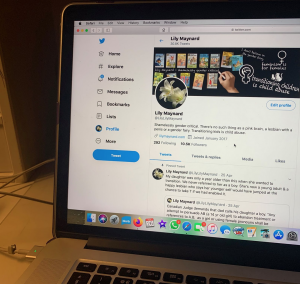
Oh Twitter, how you consume my time…
Nor have I found a publisher, set up a YouTube channel or stitched the twenty foot long banner I’ve been talking about for months.
A bit less time on the Internet would go a long way. Let’s be honest, a bit less time on Twitter would go a long way.
The gender movement
The break was quickly over, we took our seats and the meeting resumed.
A woman told us how her daughter had burst into tears and told her, “you don’t understand, we’ve been taught to accept this.“

Sonia does some filming.
Stephanie observed that while the gender movement seems to have become a youth movement, it will pass and become dated. Once young people realise they’ve been conditioned to believe in it by the establishment, they’ll realise it’s not a real rebellion. She told how a friend of hers had been called a bigot by her nephews.
A woman said there were not many young people at the meetings now. Someone agreed that it was fracturing relationships between parents and children and asked if schools had an obligation to teach children about grooming. Stephanie said they didn’t, but agreed that part of relationships and sex education should be about recognising manipulative tactics, and the strategies used to teach gender ideology were a prime example of these.
“This movement will go full circle,” predicted Stephanie, “and young people will start rebelling against it.”
Another woman wondered why so many TV shows were sexualising young people: and a discussion ensued about the promotion of transition and prostitution, and normalising of pornography in the music industry and media as a whole.
“Why are there more girls than boys?” asked someone else.
“Because girls are oppressed,” replied Stephanie. “Now that you’re a girl or boy based on your internal feelings, of course more girls are identifying as boys.”
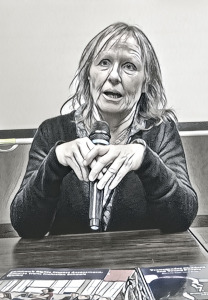 When girls see themselves being treated as lesser than boys and want to be treated as fully rounded human beings, why would it not seem to make sense to think you were a boy?
When girls see themselves being treated as lesser than boys and want to be treated as fully rounded human beings, why would it not seem to make sense to think you were a boy?
“When I was a child I felt that I was a boy,” she told us. “Now I recognise that I just felt like a human being.”
A woman said it was an overwhelming “international, global, male sexual rights movement intent on exploiting children, girls and women” and that we all needed to start organising together against it.
Stephanie said she felt that radical action is happening now, in many different ways, with meetings, conversations, in courts, in women’s groups; in the Transgender Schools packs which go into schools around the country. Public awareness is on the up and a lot of progress has been made this year. Lisa Littman is doing another study but more research needs to be done.
At the NHS meeting on Gender Identity Services, Stephanie was told, ‘we don’t like the word detransitioners, we see it as just another step on the gender journey‘. This is serious, she warned, “the next bit of conditioning… and of course it lets the NHS off the hook.”
Question time drew to a close and Jan introduced the final speaker “Heidi the radfem pirate.”
Heidi (the RadFem Pirate)

Heidi described herself as a mother and grandmother who used to work as a senior domestic worker specialising in children escaping domestic violence.
She said she was speaking out for all the women and girls who had been forced out of spaces by men pretending to be women. “They’re not women in any way, they’re simply men.”
Most sexual assaults are carried out by men against women, and unisex spaces give men more chances to take advantage of vulnerability. It is gaslighting to expect women to use female pronuns when addressing a man.
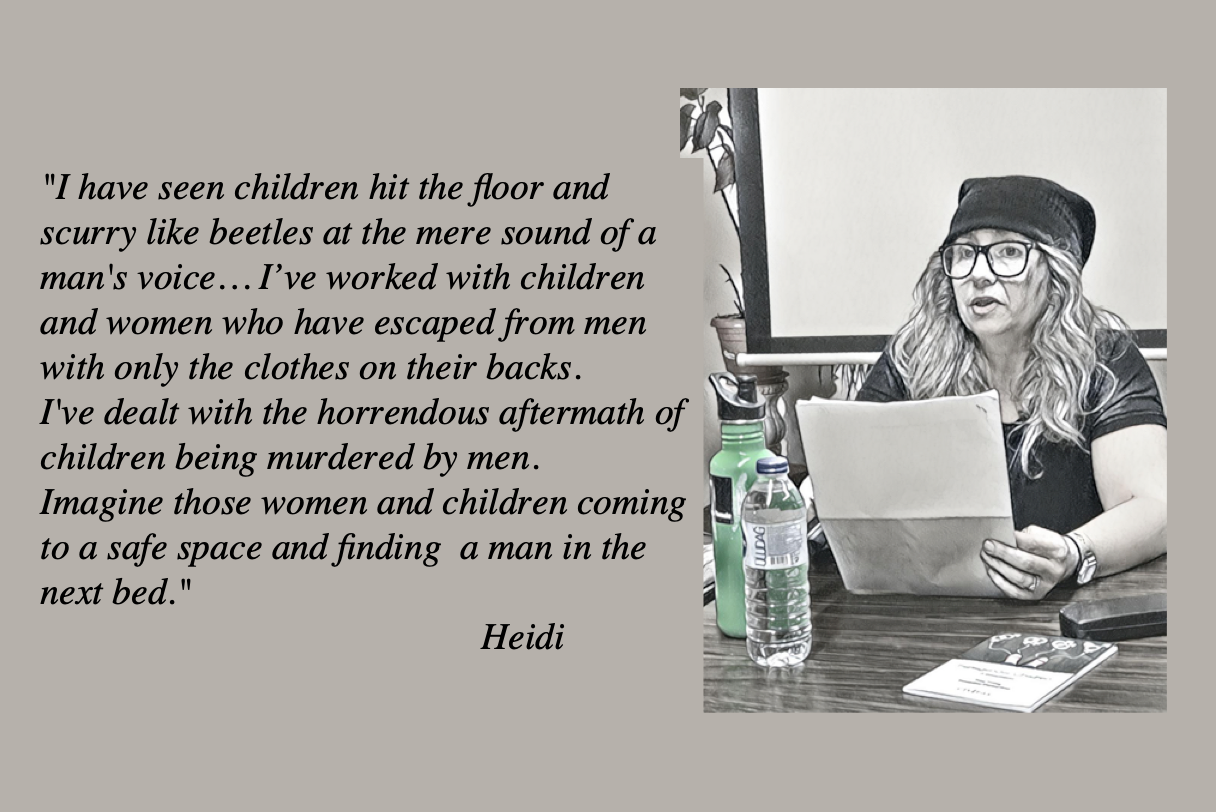
Businesses and organisations, from high street clothing companies to the Girl Guides are allowing men into women’s spaces, while pretending they still offer single sex provisions.
She reminded us that women had fought for the right:
“to compete in sports, to vote, to go into bars, to have public toilets, to go to university, to play sports, to wear trousers, to exhibit our arts and crafts, to write books, to join the armed forces, the police, the fire service,” concluding, “our sex is the reason we need safeguards in place.”
This was met with applause.
When single sex facilities are abused, women are put at risk; whether for faith-based reasons or otherwise, women need single sex provisions to protect their safety, especially in places like hospital wards, toilets and refuges where women are most vulnerable. Politicians are supporting this.
“Women’s rights are not only being eliminated but the right to be a woman is also being extended to men. This Orwellian madness needs to stop. This is about the safety of women and girls not the feelings of men.”

“If you wouldn’t lie to your child and tell them they can become Yoda, why would you lie to a child and tell them they can change sex?”
Why, she asks, are men being allowed to claim they are expanding the bandwidth of what it means to be a woman rather than expanding the bandwidth of what it means to be male?
Her ten year old son, she said, was desperate to be Yoda for several years, and would have believed her if she had told him he could do so when he grew up. He would gladly have taken any pill if it had turned him into Yoda. To tell children they can change sex is a lie. How can an adult push a child down this path? Remove the stereotypes and what is there left to transition?
Women must refuse to accept the language men are forcing on us because if we cannot define woman, we cannot protect our sex-based rights.
Inspired by women like Posie Parker, Hannah Clarke, Venice Allan, Julia Long, Meghan Murphy and particularly Magdalen Berns, Heidi says she wears her ‘adult human female’ T shirt for a long list of reasons, concluding, “….I wear it for all the children being sold a horrifying lie, I wear it for women’s rights.. I wear it because I refuse to lie, I refuse to be silent, I refuse to be gaslit, and I wear it because it bloody well needs to be worn!”
She praised Posie Parker “a woman who wasn’t content to sit on her arse and look the other way, a woman who wouldn’t be silent, a woman who, along with many others has been banned permanantly from Twitter and Facebook simply for speaking the truth.”
She said she would finish with her favourite Magdalen Berns quote “Oh fuck off, you wanker!”
Message from Anne Ruzlyo
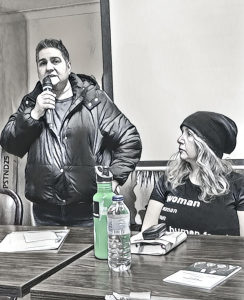
Georgia read out a message from Anne.
“Hello everyone. I’m so disappointed I can’t be with you tonight. I hope you all have a fabulous evening.
I was a prison officer at Holloway and Downview and have seen the bonds that women prisoners form with each other. Some build life-long friendships. They help each other through the hardest of times. They have shared experiences of secual abuse, drug addiction, prostitution etc. They are victims of circumstances that have been created by men. Therefore it is not acceptable to allow men – abusive, violent, narcissistic, fetishist, sex offending men into women’s prisons. Ever…
Women in prison deserve to be safe and secure, something the majority of them have never had or felt on the outside. These men are manipulating the system and I am disgusted by the prison service for allowing the safety of these women to be compromised… there now appears to be no duty of care to these women… finally, I support the prisoner who has taken a legal case against Downview Prison and I would urge you to donate to her crowdfunder if you can.”
“I’ll take that round of applause for being for all our wonderful speakers.” concluded Jan. Please also show your appreciation for the wonderful local resisters. Head out of here, turn right to the pub, so our volunteers can clear up quickly. We’re very grateful to the venue for housing us.”
When the applause died down, we headed for the door.
“That was quite a trek for you,” I said to Lesley. “Bet you’re looking forward to chilling in the pub for a bit.”
“Argh, no,” she replied. “I’ve got a job to finish for the morning. I have to drive home again.”
And she disappeared out into the chilly London darkness, to face that drive all the way back up the motorway. That’s what I call commitment. Or madness. I’m not quite sure which.

Me? I walked to the pub with Stephanie, where the lovely Jan bought me a pint of delicious lime soda. Thanks Jan. That was a great meeting. I lost you in the hurlyburly of the bar, but next time the drinks are on me.



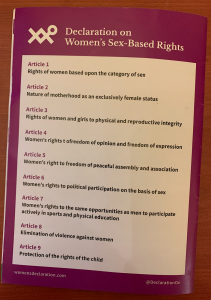
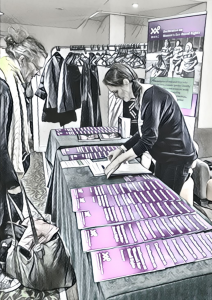 Although we arrived early, plenty of others were there before us, bright-eyed and bushy-tailed despite the early hour. We registered at the front desk, hung up our coats and took a copy of the programme and a summary of the Declaration on Women’s Sex Based Rights. The hall was already filling up, coats and bags reserving chairs; attendees milling around and drinking the surprisingly palatable coffee provided. For those so inclined there was also chilled still or sparkling water, and a rainbow of tea bag options.
Although we arrived early, plenty of others were there before us, bright-eyed and bushy-tailed despite the early hour. We registered at the front desk, hung up our coats and took a copy of the programme and a summary of the Declaration on Women’s Sex Based Rights. The hall was already filling up, coats and bags reserving chairs; attendees milling around and drinking the surprisingly palatable coffee provided. For those so inclined there was also chilled still or sparkling water, and a rainbow of tea bag options.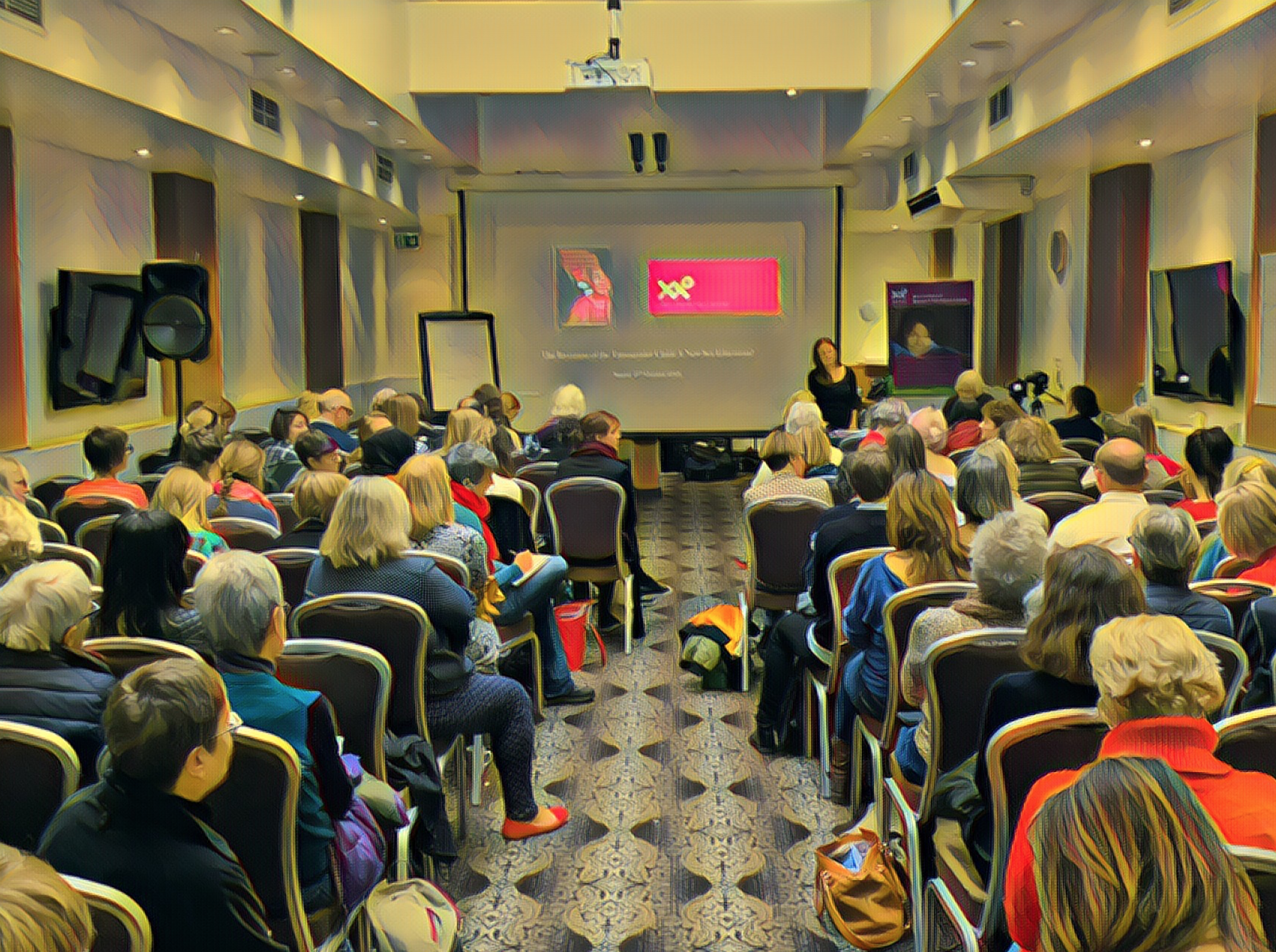
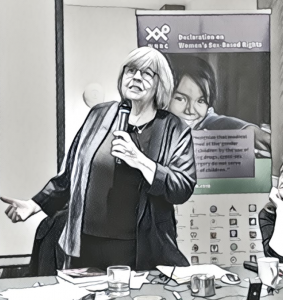 Maureen O’Hara of WHRC introduced herself and reminded us that a summary of the Declaration of Sex Based Rights was available on the registration table and that the full Declaration could be seen and signed
Maureen O’Hara of WHRC introduced herself and reminded us that a summary of the Declaration of Sex Based Rights was available on the registration table and that the full Declaration could be seen and signed 
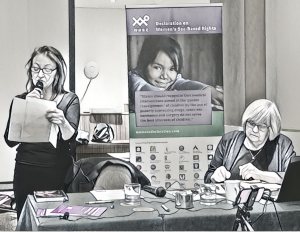 “… the new language of sex and gender which has been developed by lobby groups and which is evolving while we speak… this language justifies that a trans woman is real. Not that he is a male human being who has the right – in my view- to ‘identify’ as female, but that he really IS a woman and has been since birth, ie he was born female… he is a woman, a fact for which he is not responsible and which is transphobic to even question…
“… the new language of sex and gender which has been developed by lobby groups and which is evolving while we speak… this language justifies that a trans woman is real. Not that he is a male human being who has the right – in my view- to ‘identify’ as female, but that he really IS a woman and has been since birth, ie he was born female… he is a woman, a fact for which he is not responsible and which is transphobic to even question… Dr James Barratt, Lead Clinician at the NHS Gender Identity Clinic (GIC) for adults argues that binary sex in the human mammal is ‘less than common sense’.
Dr James Barratt, Lead Clinician at the NHS Gender Identity Clinic (GIC) for adults argues that binary sex in the human mammal is ‘less than common sense’. In her book, co-edited with Michele Moore, Brunskell-Evans explores the role of the Tavistock and NHS GIDS close links with lobby groups and their role in inventing the transgender child. The Tavistock promotes not only the idea that a boy can be born with a ‘pink’ brain but that some children, those who are ‘pan’ can have a multiple essential genders. Brunskell-Evans asserts that the adult obsession with transgender identity is not helping the health of children and young adults and damages all children, gender confused or otherwise.
In her book, co-edited with Michele Moore, Brunskell-Evans explores the role of the Tavistock and NHS GIDS close links with lobby groups and their role in inventing the transgender child. The Tavistock promotes not only the idea that a boy can be born with a ‘pink’ brain but that some children, those who are ‘pan’ can have a multiple essential genders. Brunskell-Evans asserts that the adult obsession with transgender identity is not helping the health of children and young adults and damages all children, gender confused or otherwise. Sue Evans spoke of the test court case being brought against GIDS that hopes to establish that children cannot give their informed consent to radical experimental medical treatment that includes loss of sexual function and sterility.
Sue Evans spoke of the test court case being brought against GIDS that hopes to establish that children cannot give their informed consent to radical experimental medical treatment that includes loss of sexual function and sterility. ‘Can doctors really believe this stuff?‘ asked one audience member.
‘Can doctors really believe this stuff?‘ asked one audience member.
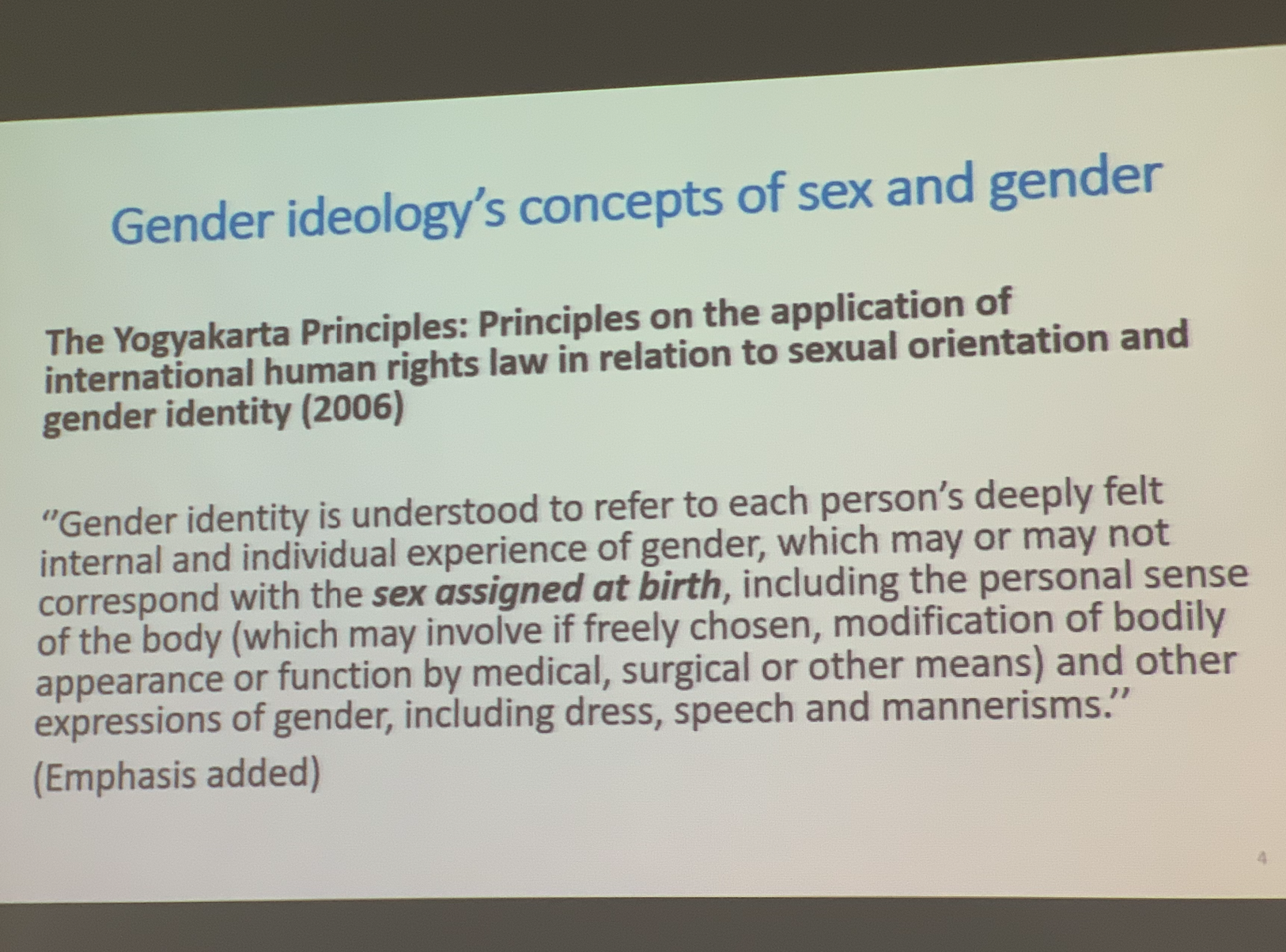
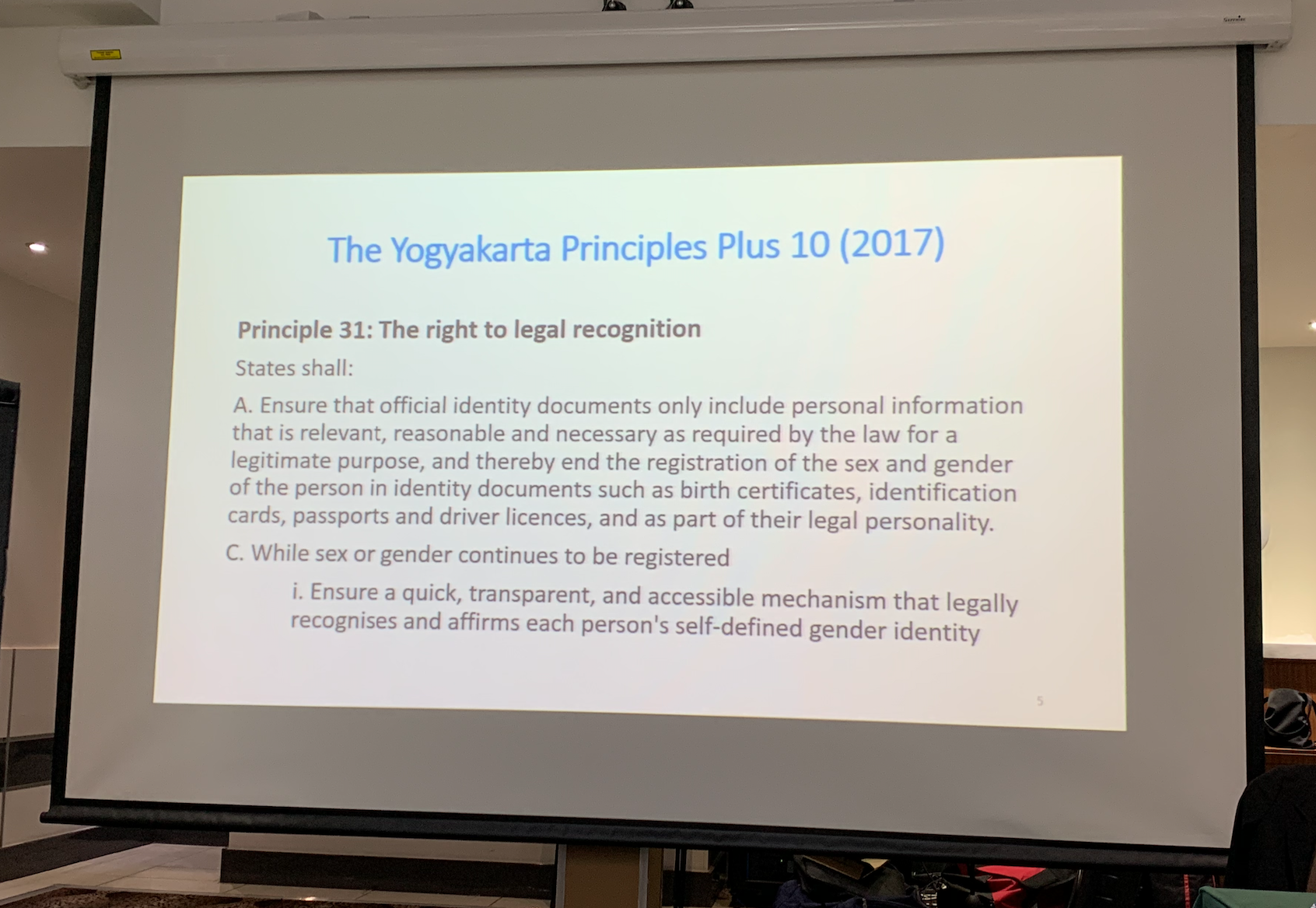
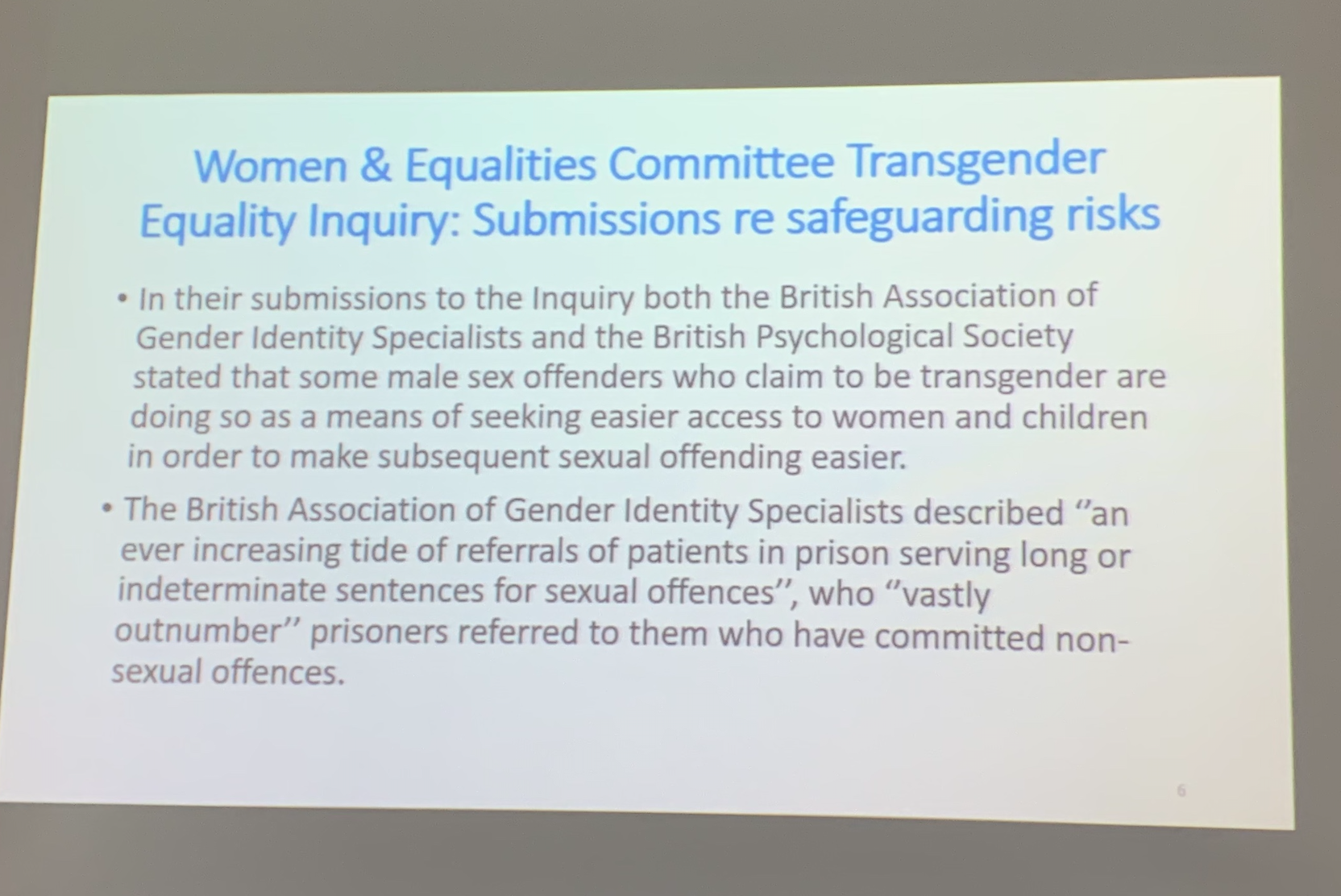


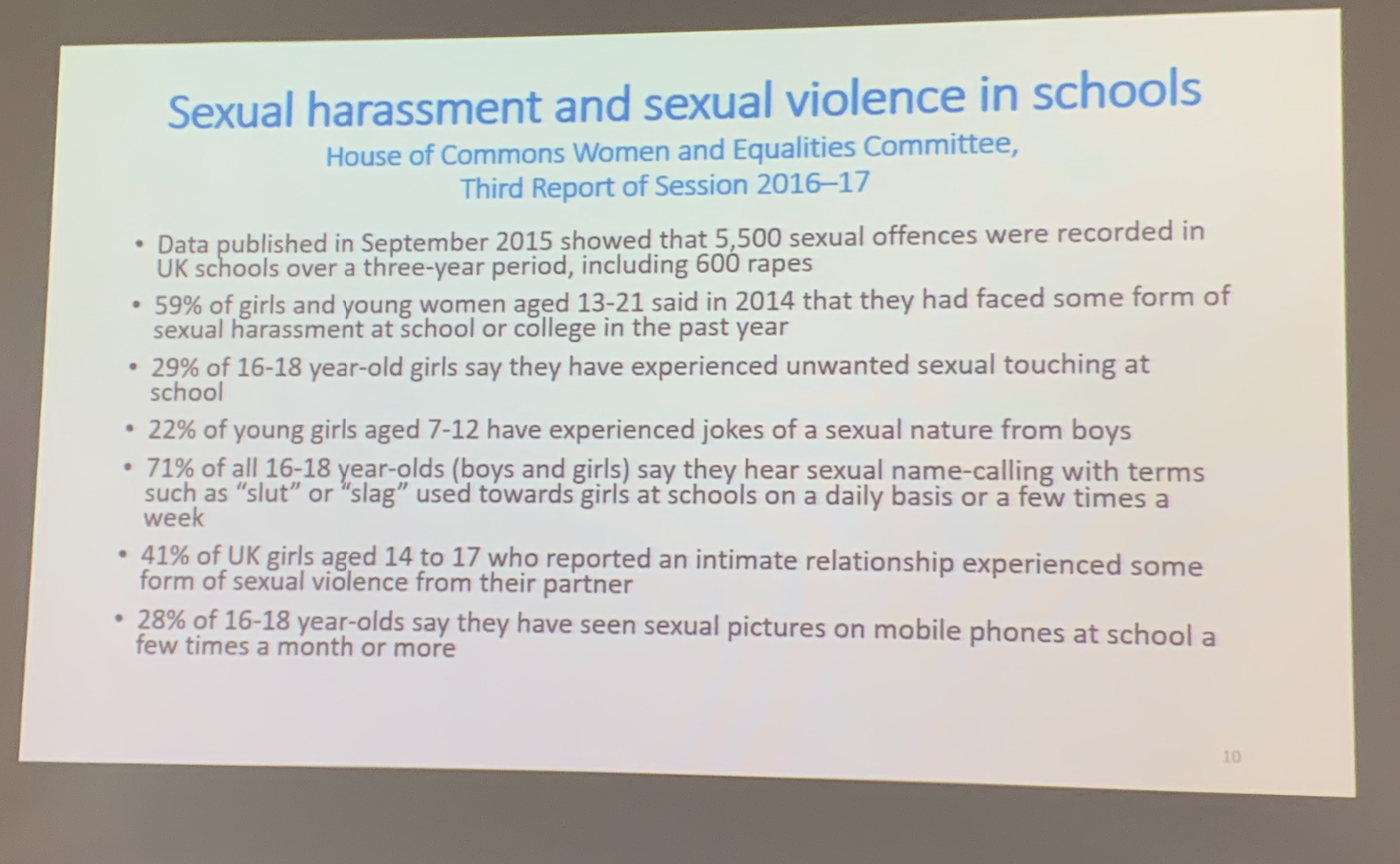
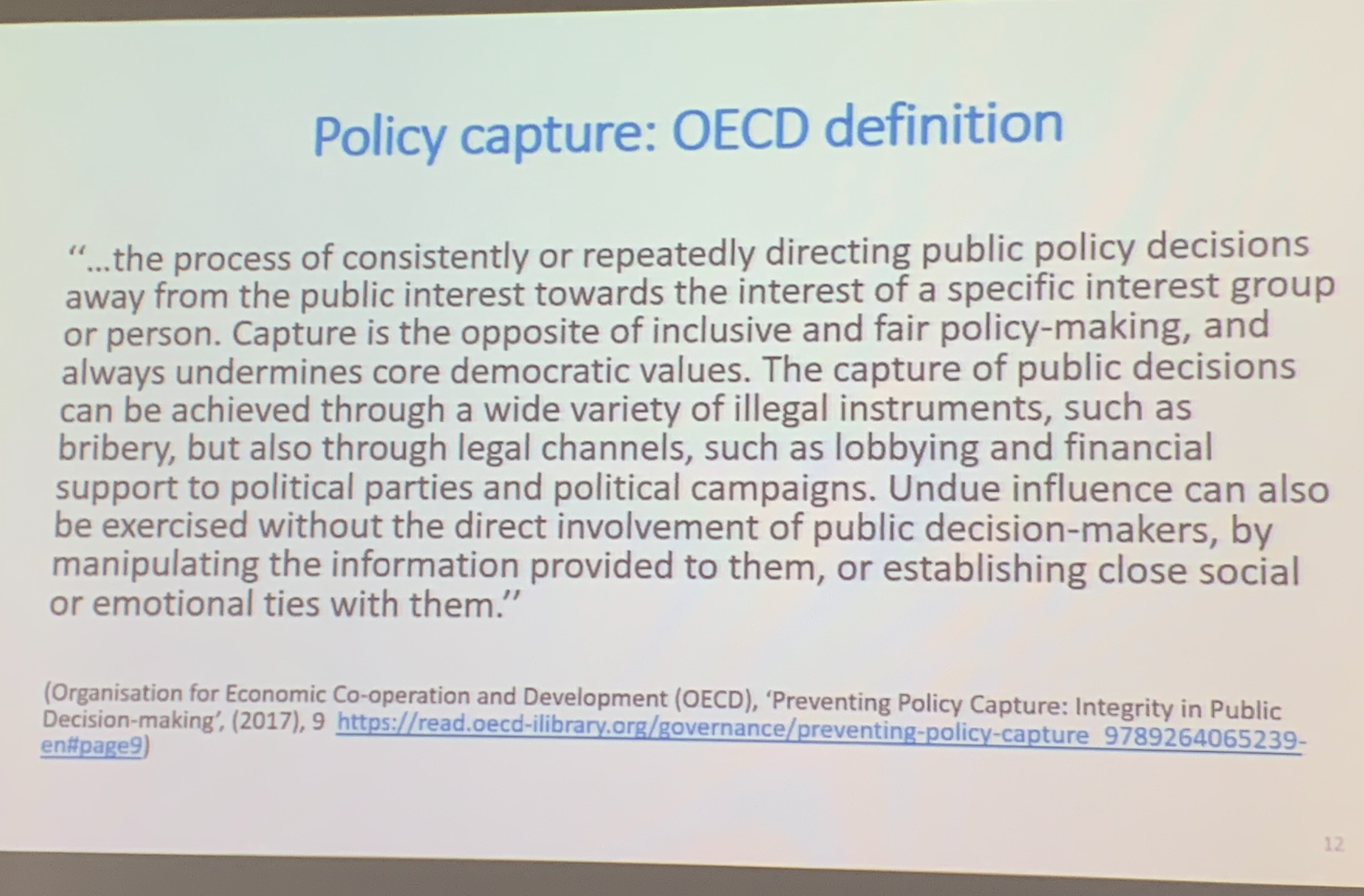
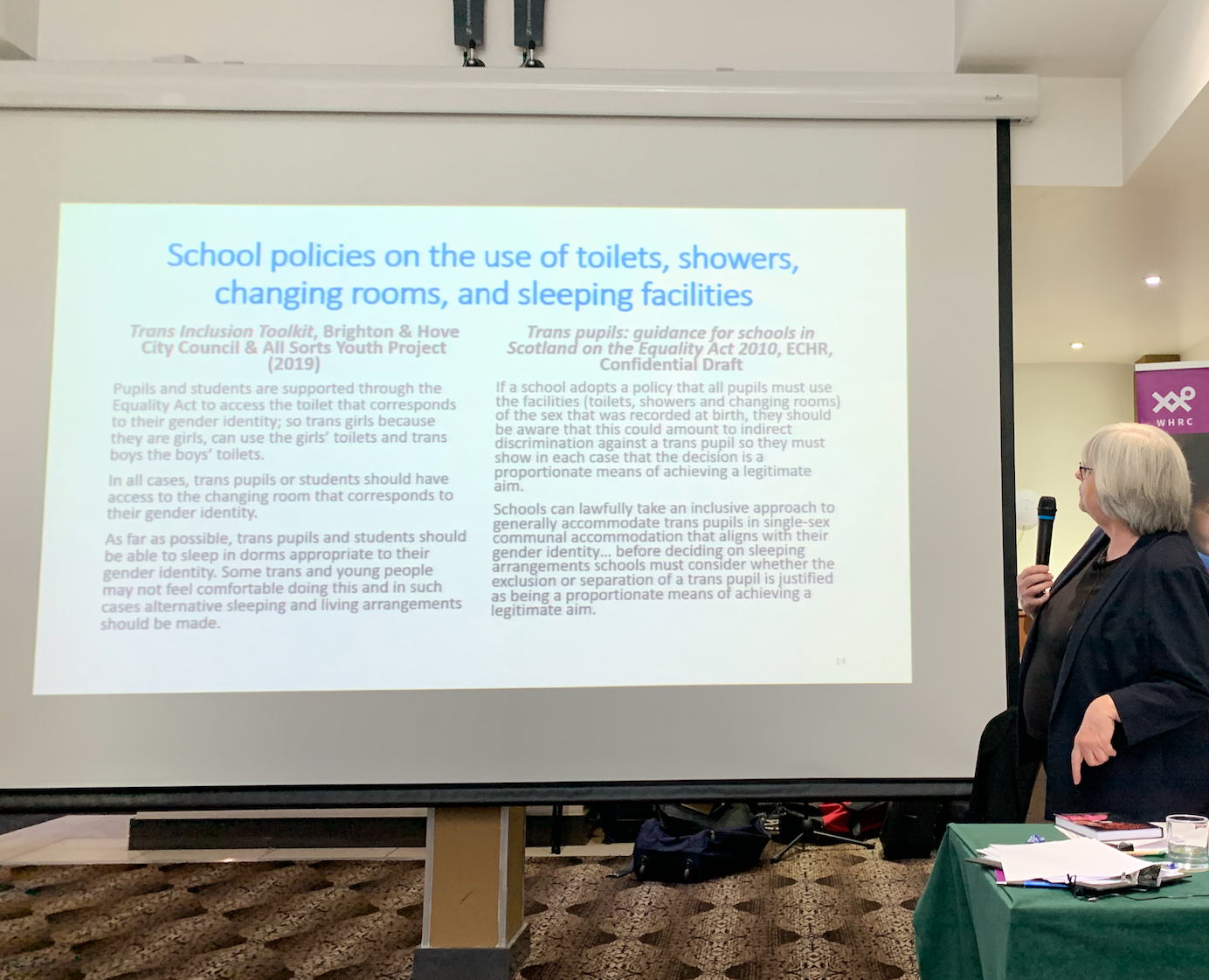

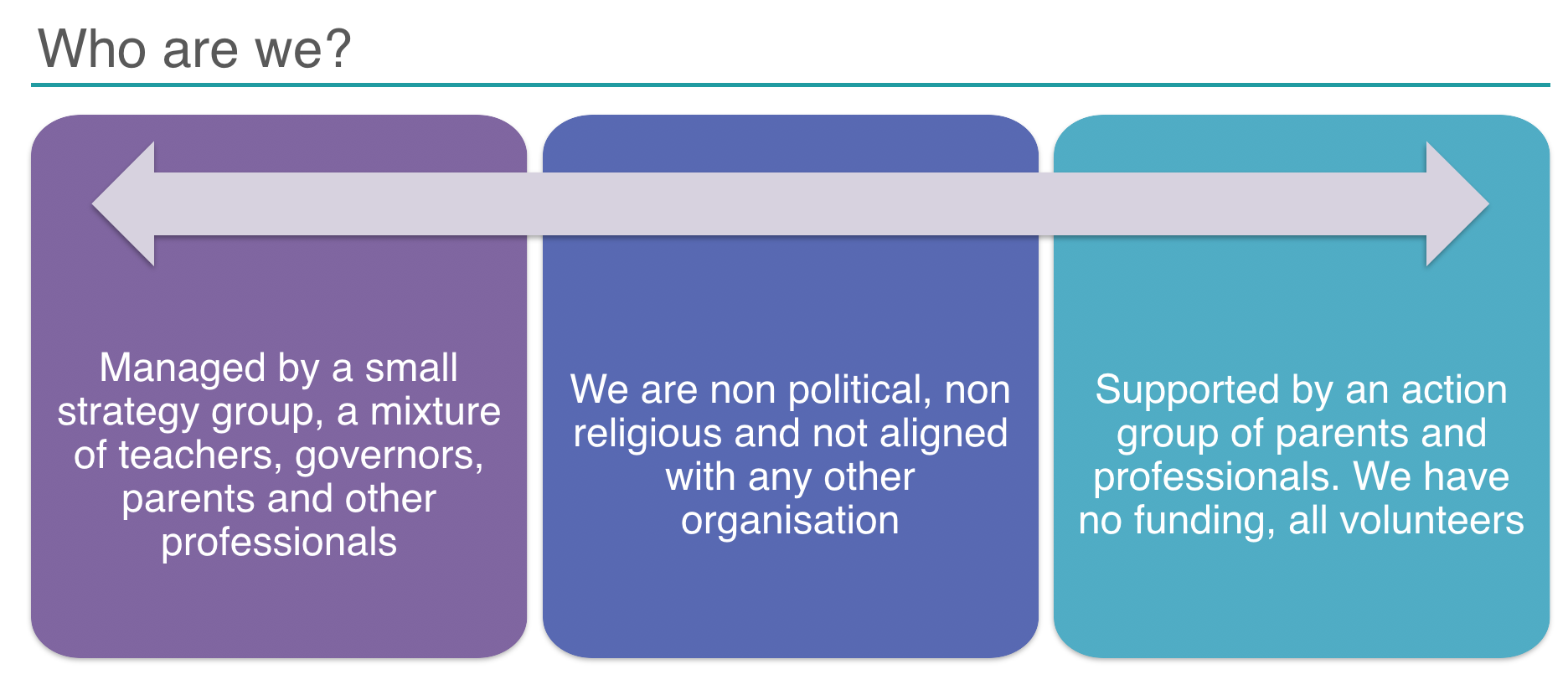
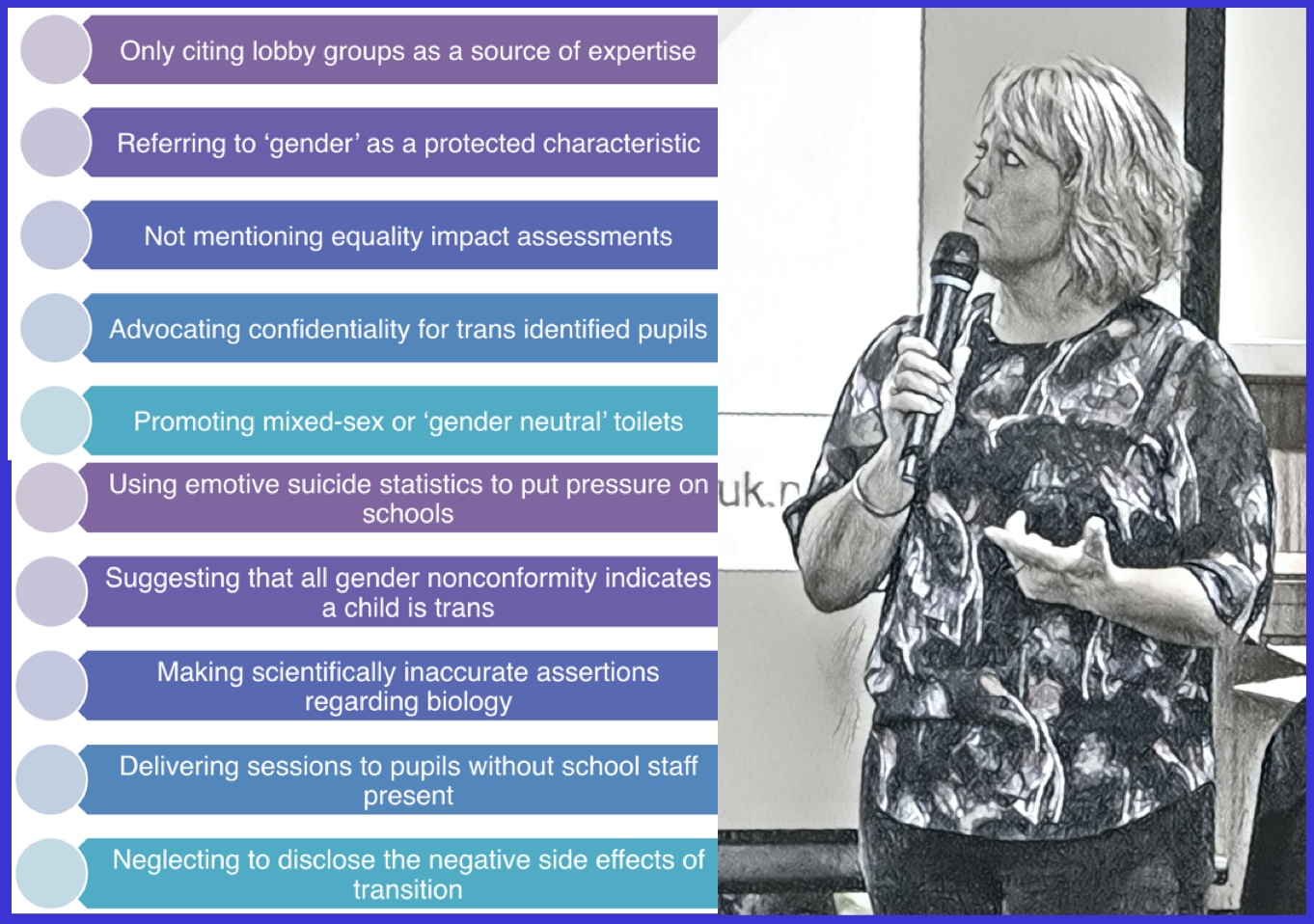
 Schools, she believes, are usually happy to discuss these issues with parents, although they tend to believe translobby guidance- for example Stonewall’s statistics on suicide- until they are explained to them.
Schools, she believes, are usually happy to discuss these issues with parents, although they tend to believe translobby guidance- for example Stonewall’s statistics on suicide- until they are explained to them.

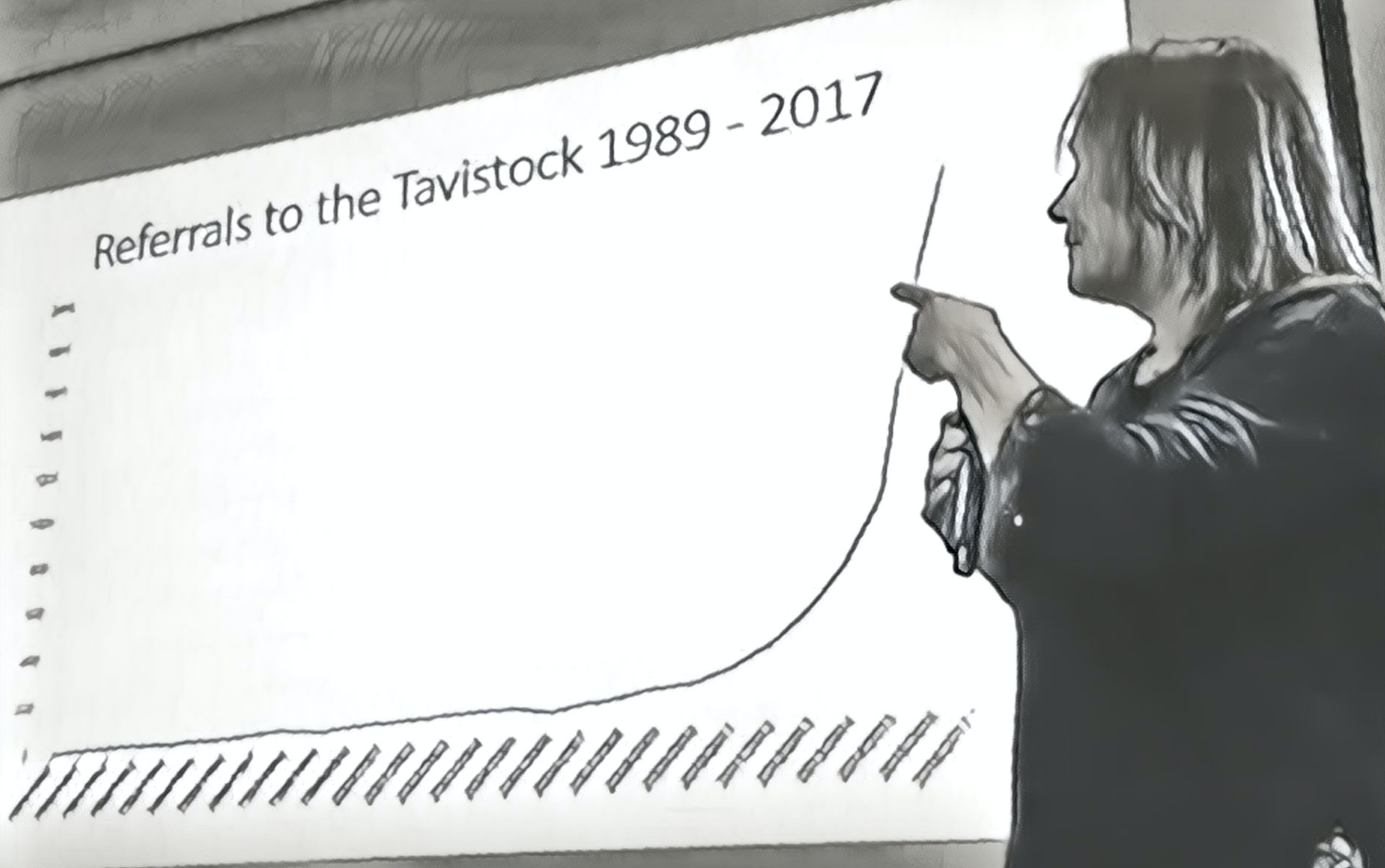
 Davies-Arai can’t speak about the national schools guidance of the Equalities and Human Rights Commission National Schools Guidance, because she is a stakeholder. She can, however, discuss the leaked Scottish guidance.
Davies-Arai can’t speak about the national schools guidance of the Equalities and Human Rights Commission National Schools Guidance, because she is a stakeholder. She can, however, discuss the leaked Scottish guidance.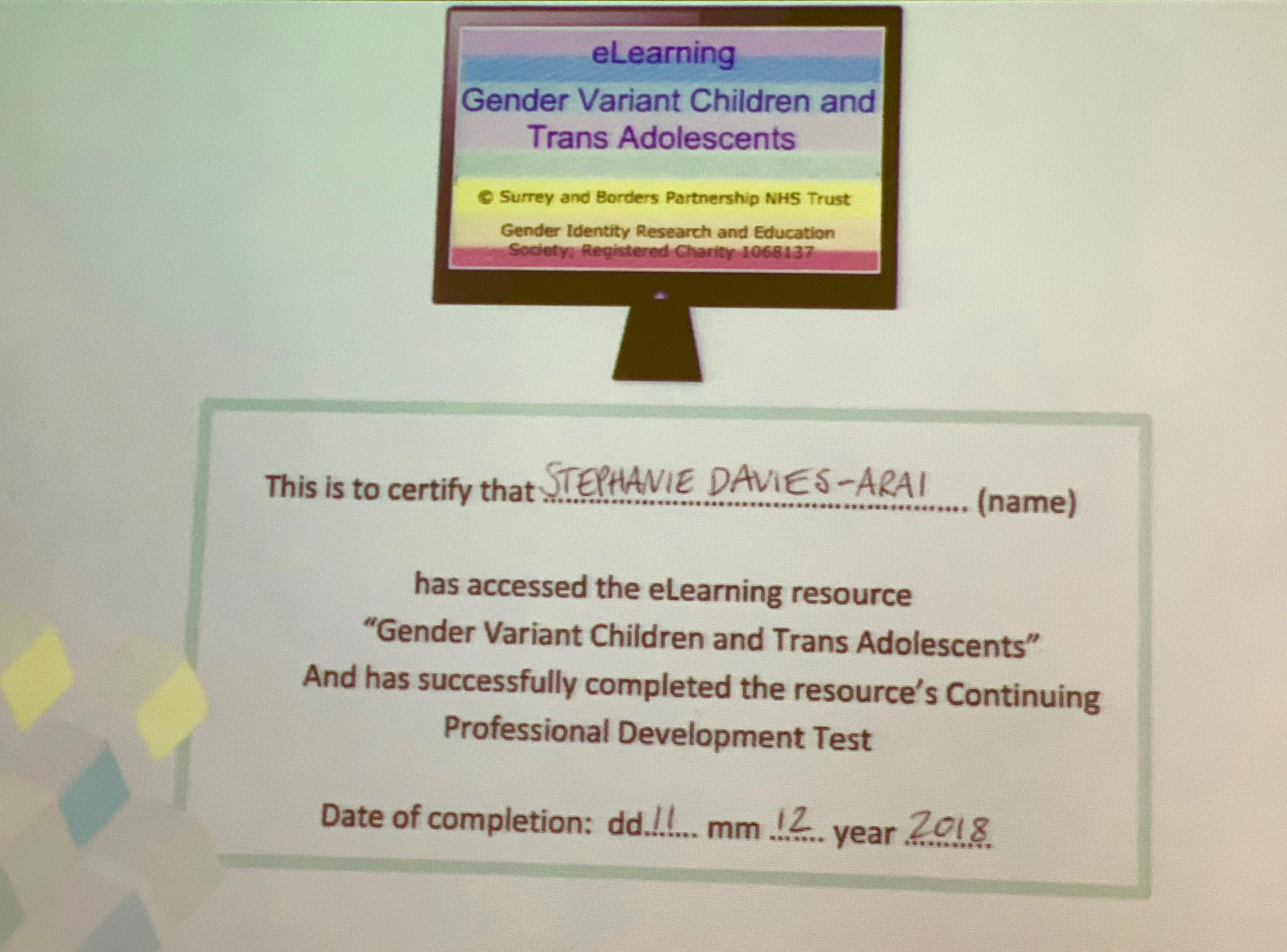 In a tongue-in-cheek heads-up to those who said she was unqualified to speak on the subject of trans kids, “as if trans kids were some magical beings that are different to every other child“, Davies-Arai completed the GIRES e-learning ‘Gender-Variant Children and Trans-Adolescents‘ course, noting that she now had the same qualification to talk about trans-kids as GP Doctor Helen Webberley.
In a tongue-in-cheek heads-up to those who said she was unqualified to speak on the subject of trans kids, “as if trans kids were some magical beings that are different to every other child“, Davies-Arai completed the GIRES e-learning ‘Gender-Variant Children and Trans-Adolescents‘ course, noting that she now had the same qualification to talk about trans-kids as GP Doctor Helen Webberley.  GIRES claims that male and female describe sex, but man and woman describe ‘psycho-social and cultural factors’ and hence gender identity, not sex. This is the denial of biological sex.
GIRES claims that male and female describe sex, but man and woman describe ‘psycho-social and cultural factors’ and hence gender identity, not sex. This is the denial of biological sex.
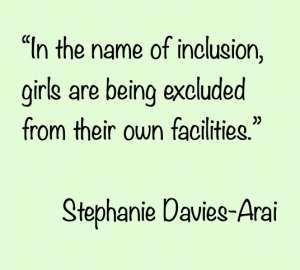
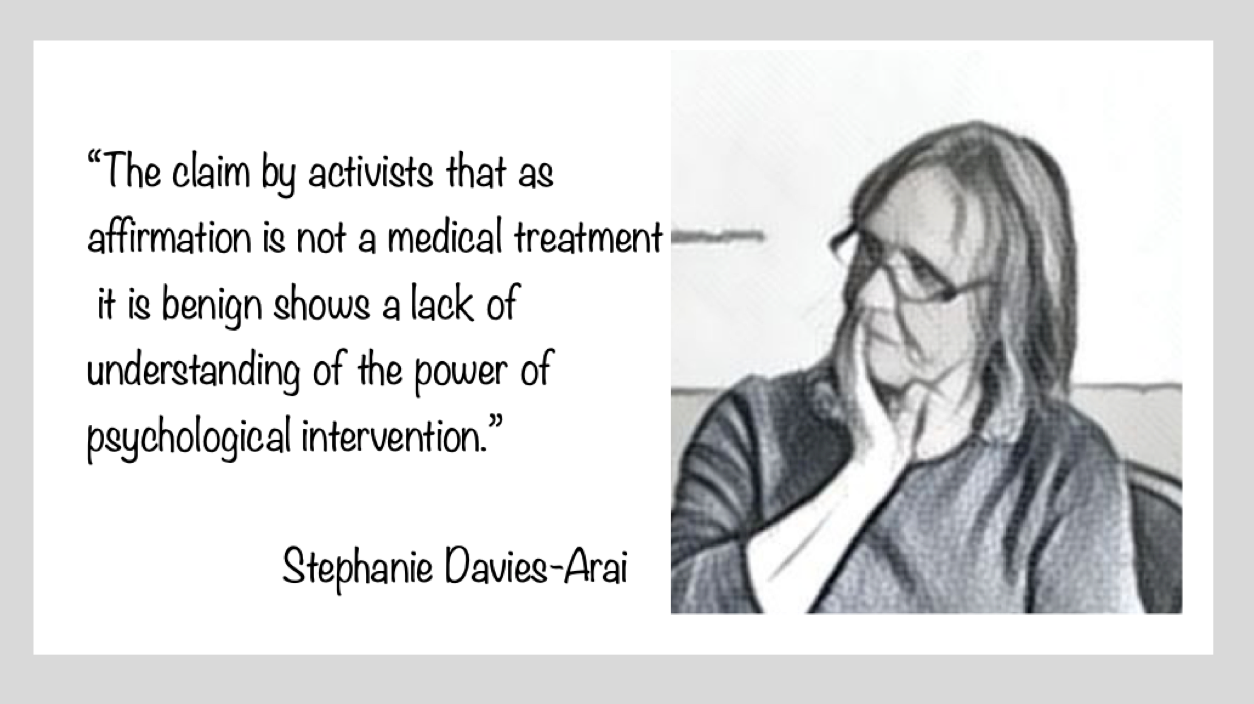 Groups such as GIRES and Mermaids push for the ever younger transition of children, and ever younger access to puberty blockers, promoting the idea that young people will self-harm without them.
Groups such as GIRES and Mermaids push for the ever younger transition of children, and ever younger access to puberty blockers, promoting the idea that young people will self-harm without them.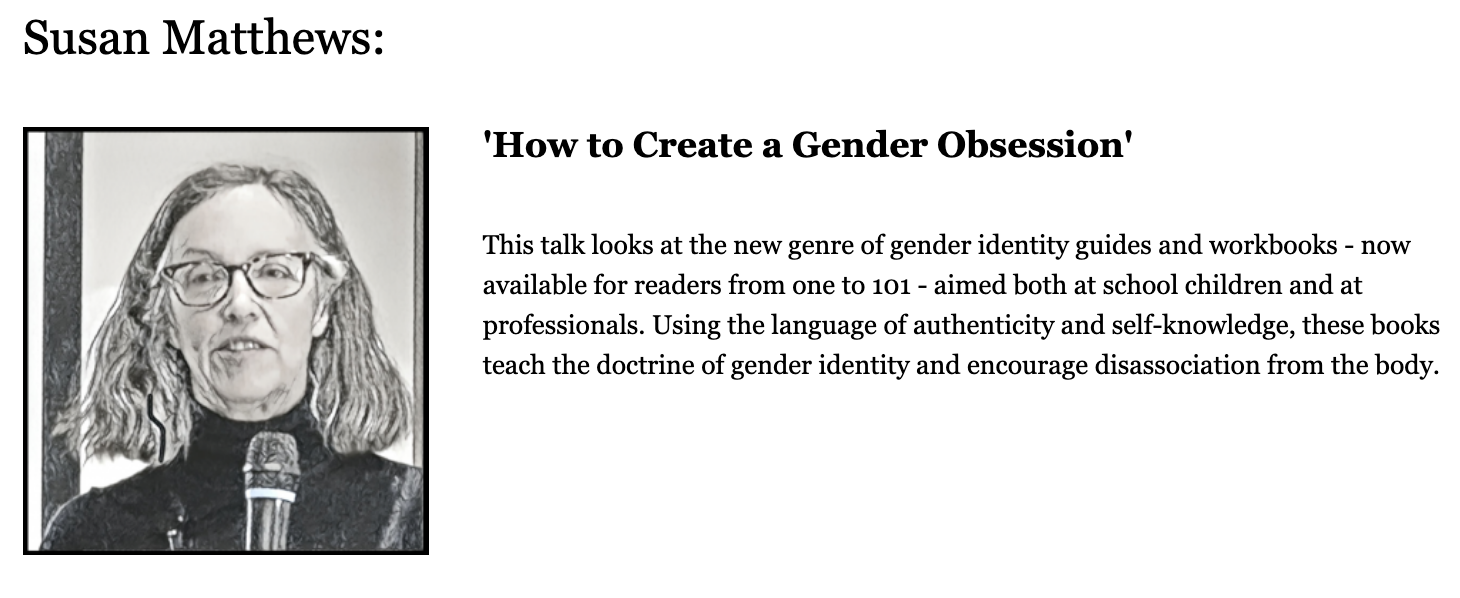
 Matthews concludes her story and turns to the audience.
Matthews concludes her story and turns to the audience. Advice includes: ‘Leave around a few books with transgender characters.. if they seem like they want to come out, but are too shy, it’s time to initiate the conversation… Remind them of one of the transgender books, and ask if they have ever felt that way…’
Advice includes: ‘Leave around a few books with transgender characters.. if they seem like they want to come out, but are too shy, it’s time to initiate the conversation… Remind them of one of the transgender books, and ask if they have ever felt that way…’ 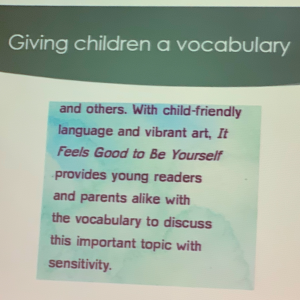 There are lots of these books, Matthews asserts. It is almost as if publishers have decided they need a book about a trans child. These books claim to give the child the language they need to express themselves, but it seems that the child needs to speak specifically with the language that they are given, and are only listened to when they say what the adult wants them to say. This she describes as “the imposition of adult categories on the child’s experience.”
There are lots of these books, Matthews asserts. It is almost as if publishers have decided they need a book about a trans child. These books claim to give the child the language they need to express themselves, but it seems that the child needs to speak specifically with the language that they are given, and are only listened to when they say what the adult wants them to say. This she describes as “the imposition of adult categories on the child’s experience.”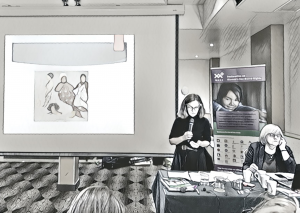
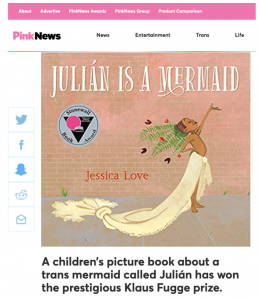 Pink News has a very different take.
Pink News has a very different take.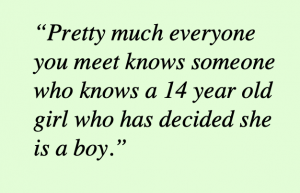 It is this adult agenda that makes the use of these books in schools of concern to Matthews, who adds “the concerns that we express are not a ‘moral panic’. A gender nonconforming girl such as Kit is overwhelmingly likely to grow up to be a lesbian if she avoids medical intervention which will distort her sexuality and hinder her fertility.”
It is this adult agenda that makes the use of these books in schools of concern to Matthews, who adds “the concerns that we express are not a ‘moral panic’. A gender nonconforming girl such as Kit is overwhelmingly likely to grow up to be a lesbian if she avoids medical intervention which will distort her sexuality and hinder her fertility.”
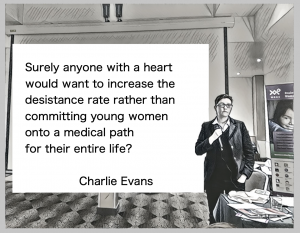 Evans believes that transition is a gamble and that there is no real evidence that transition eases dysphoria better than therapy for self-hatred and sexual trauma (where necessary) combined with support from family and friends.
Evans believes that transition is a gamble and that there is no real evidence that transition eases dysphoria better than therapy for self-hatred and sexual trauma (where necessary) combined with support from family and friends. 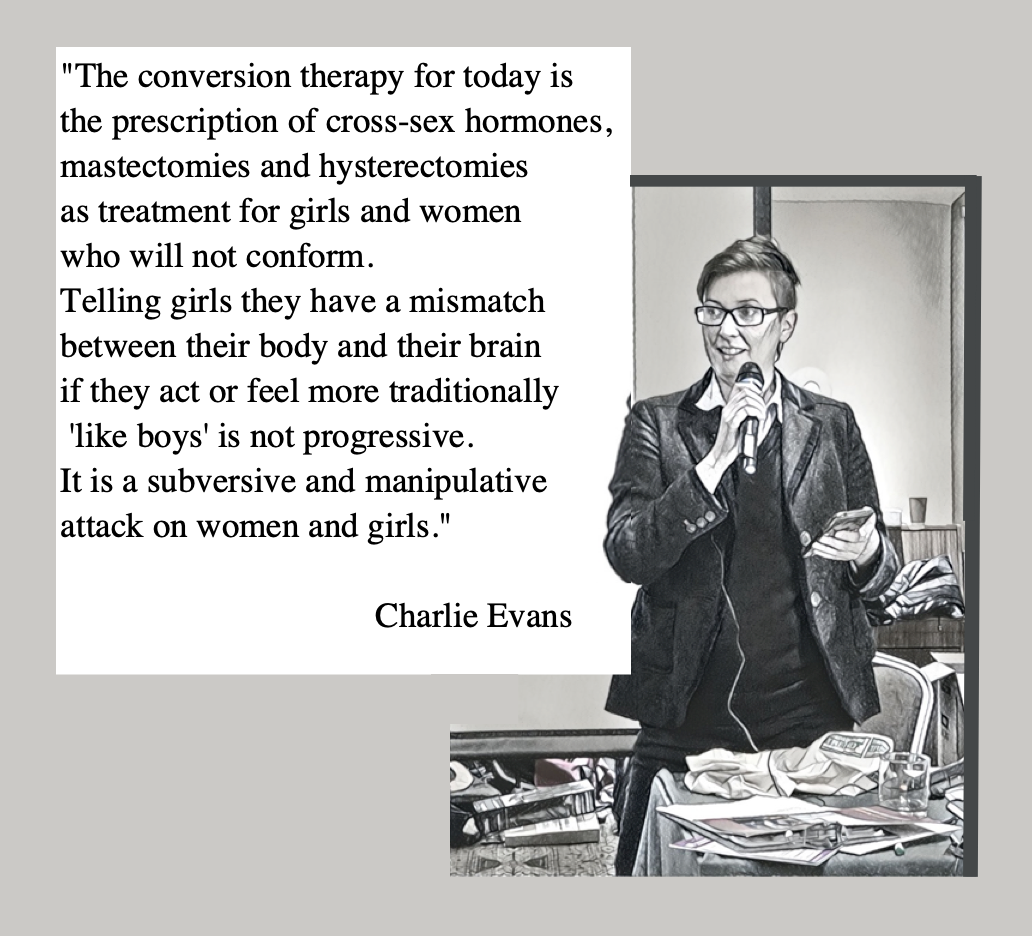
 “As a detransitioned person myself, the question what can you say, what can you do as a parent- it’s definitely super-complicated…
“As a detransitioned person myself, the question what can you say, what can you do as a parent- it’s definitely super-complicated… 
